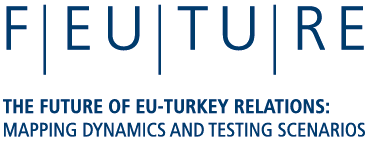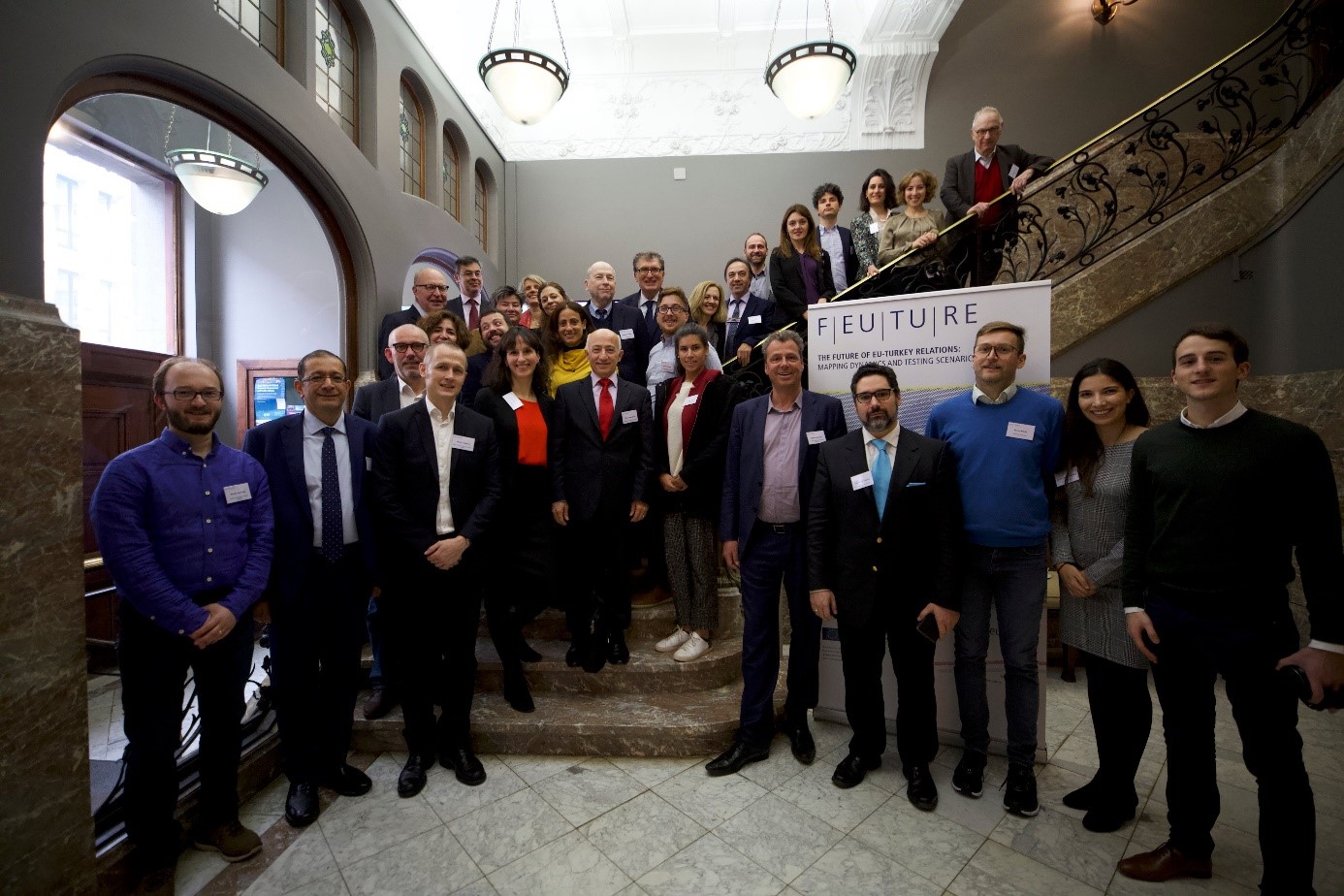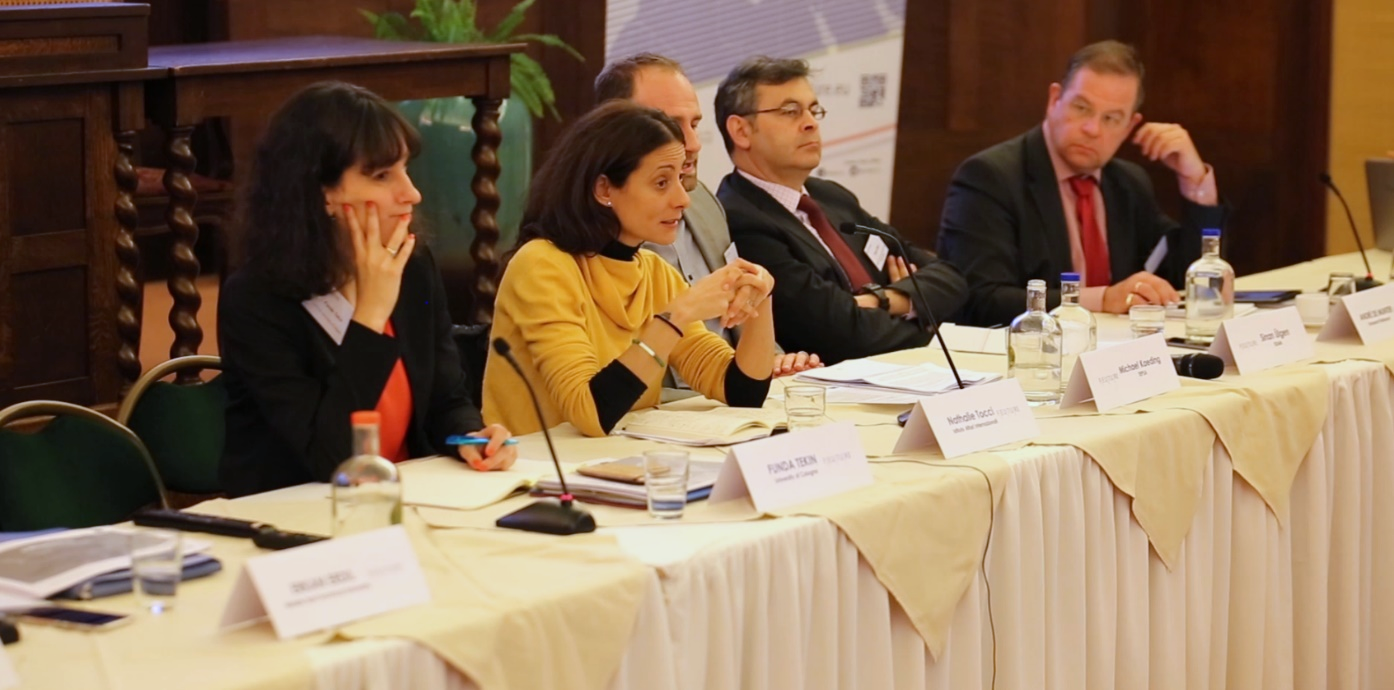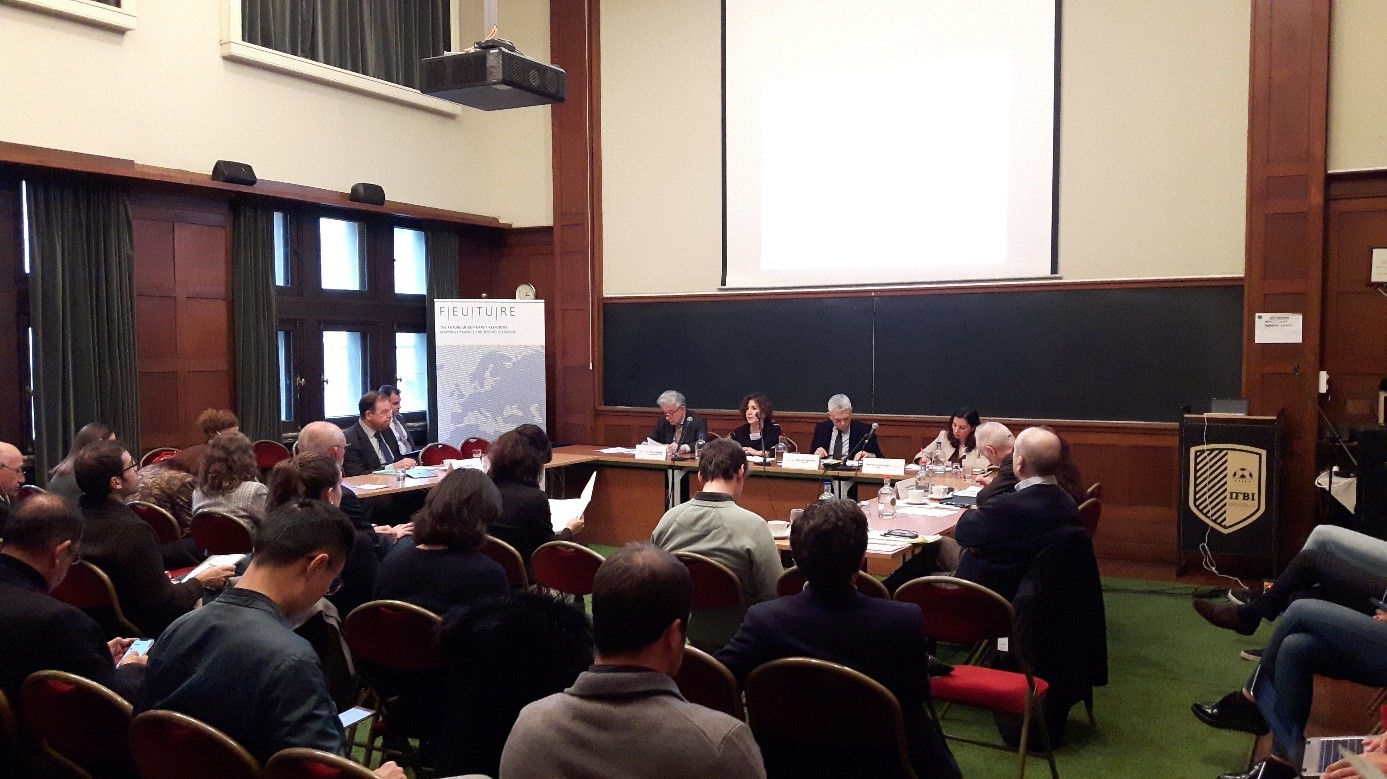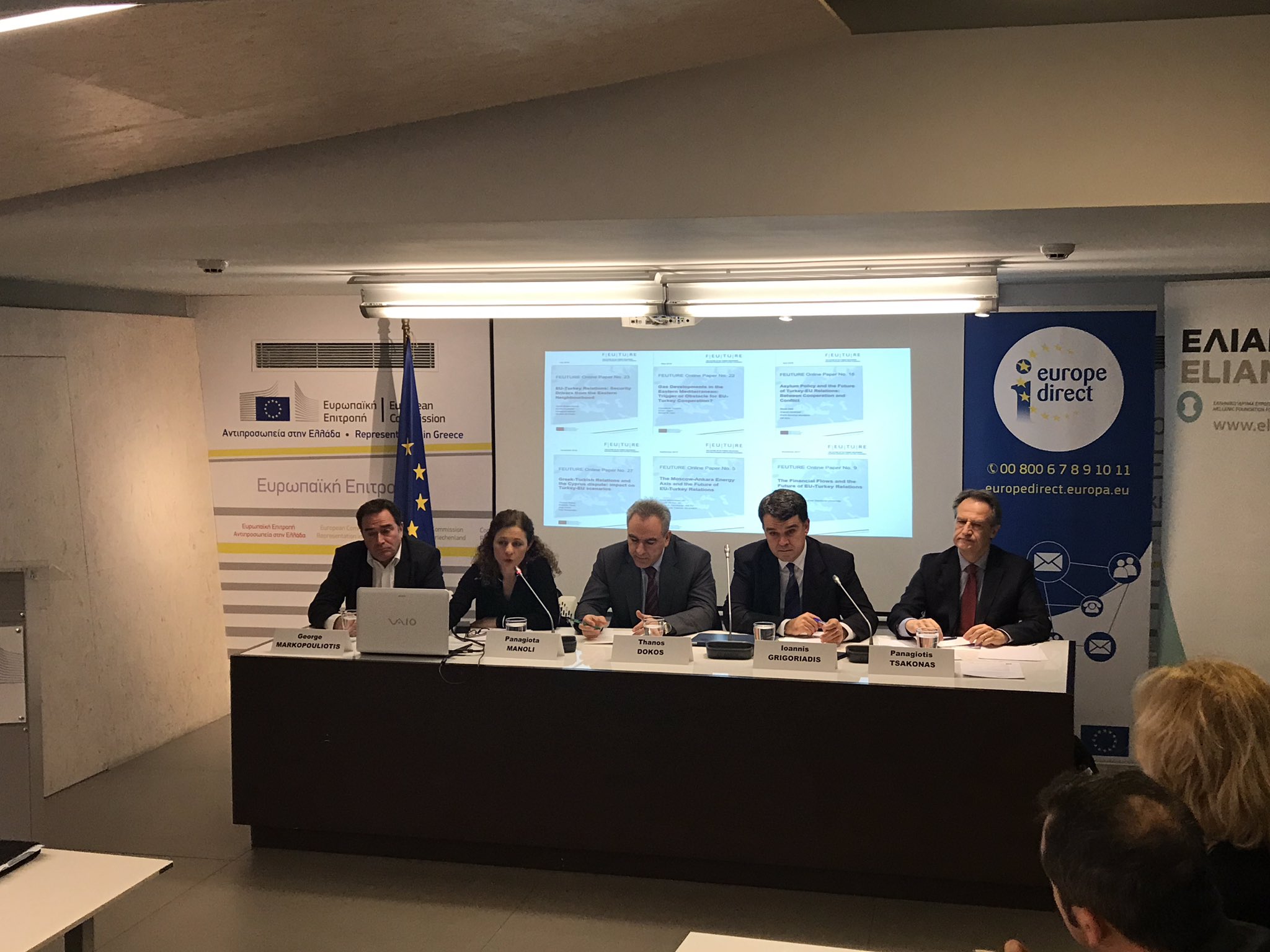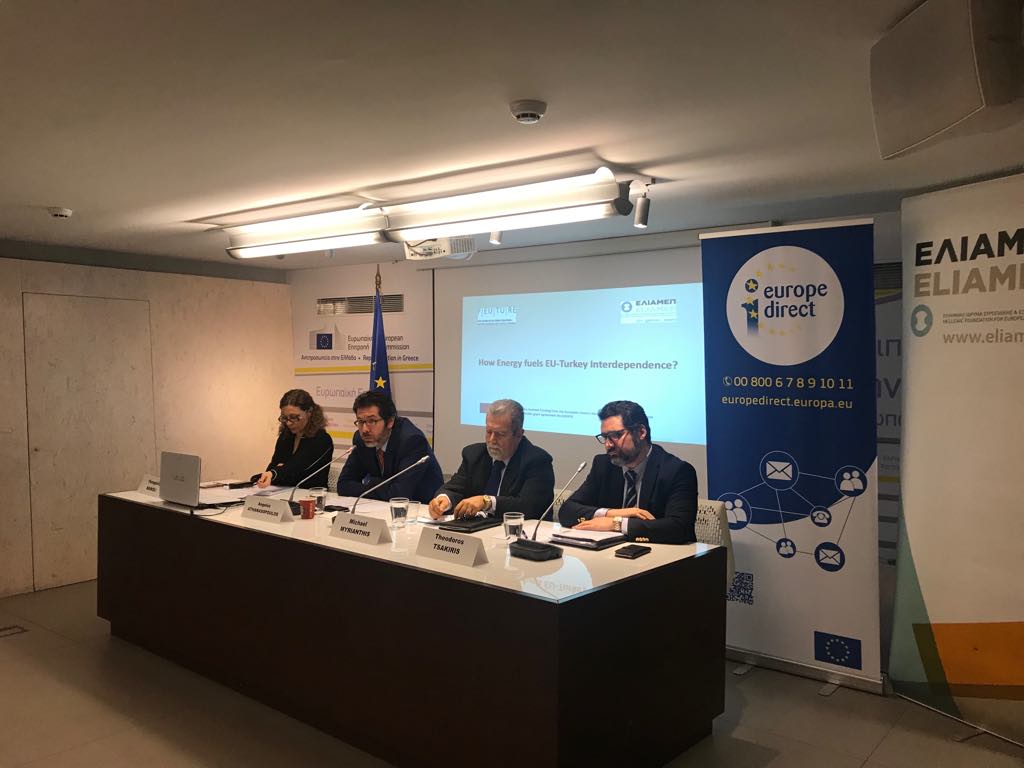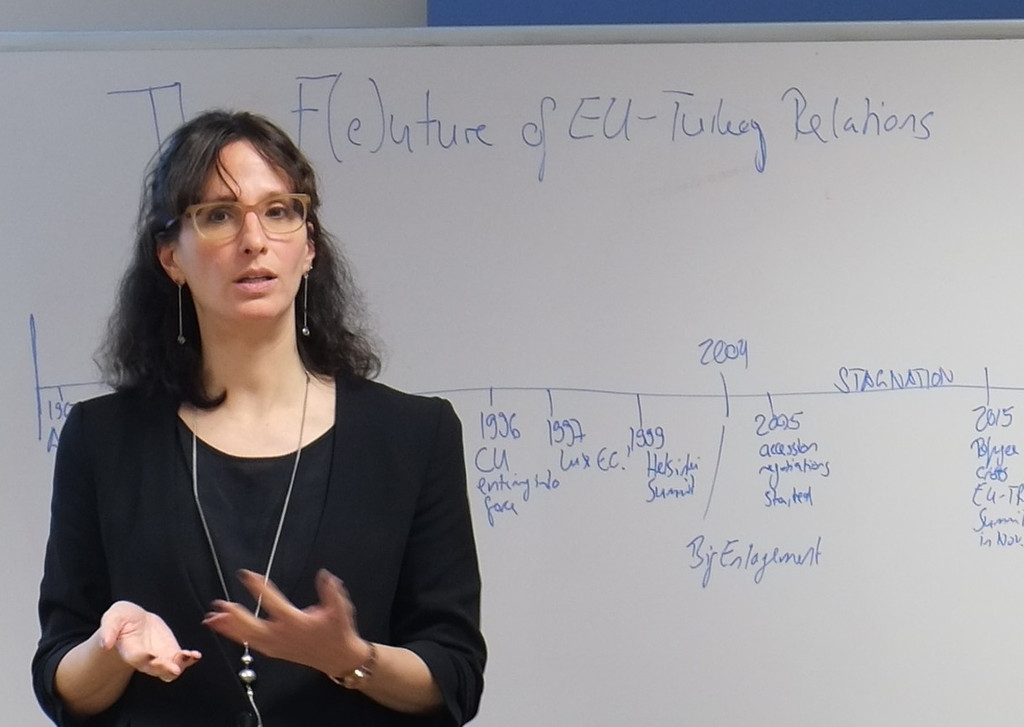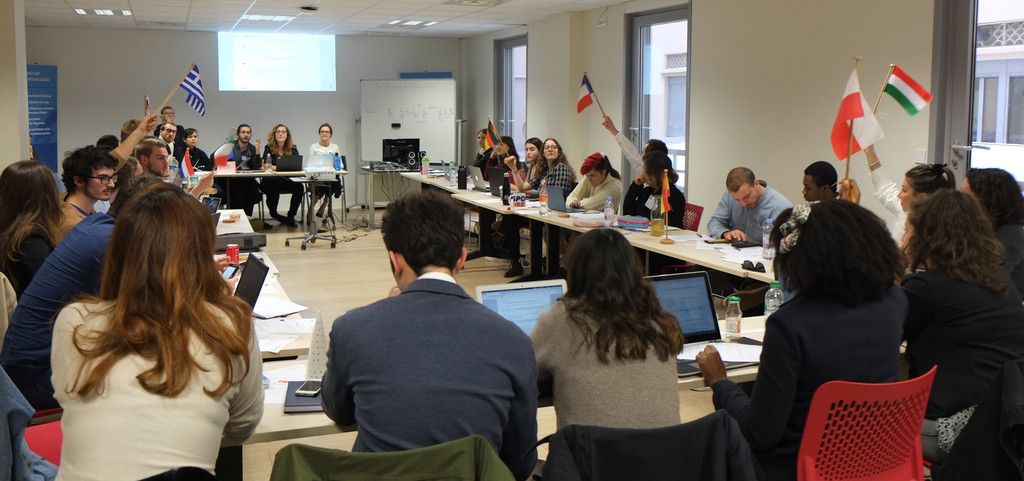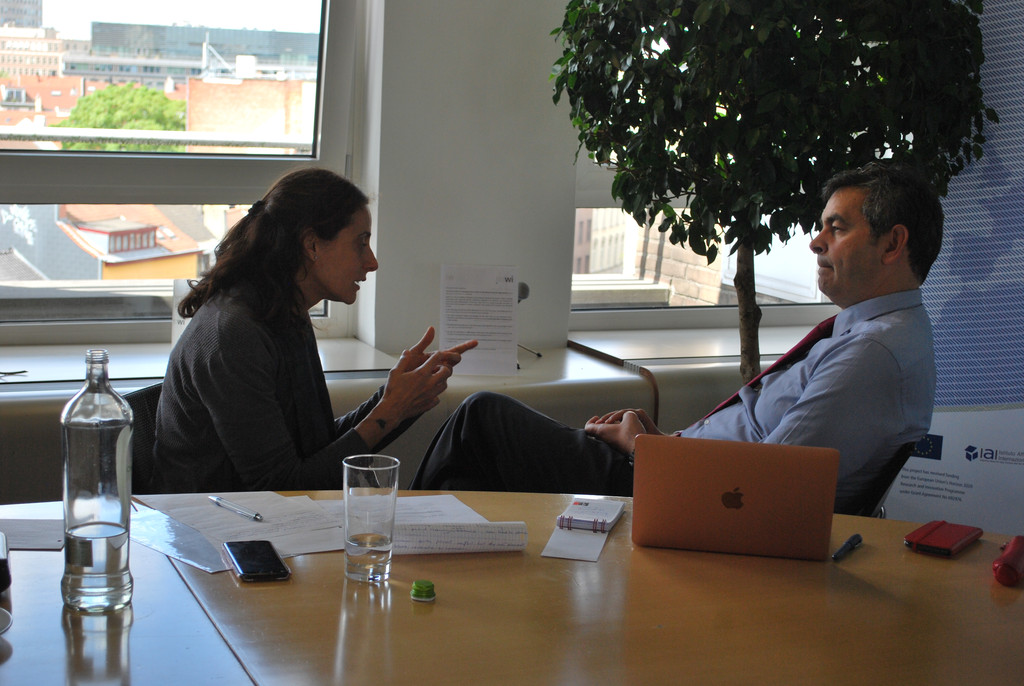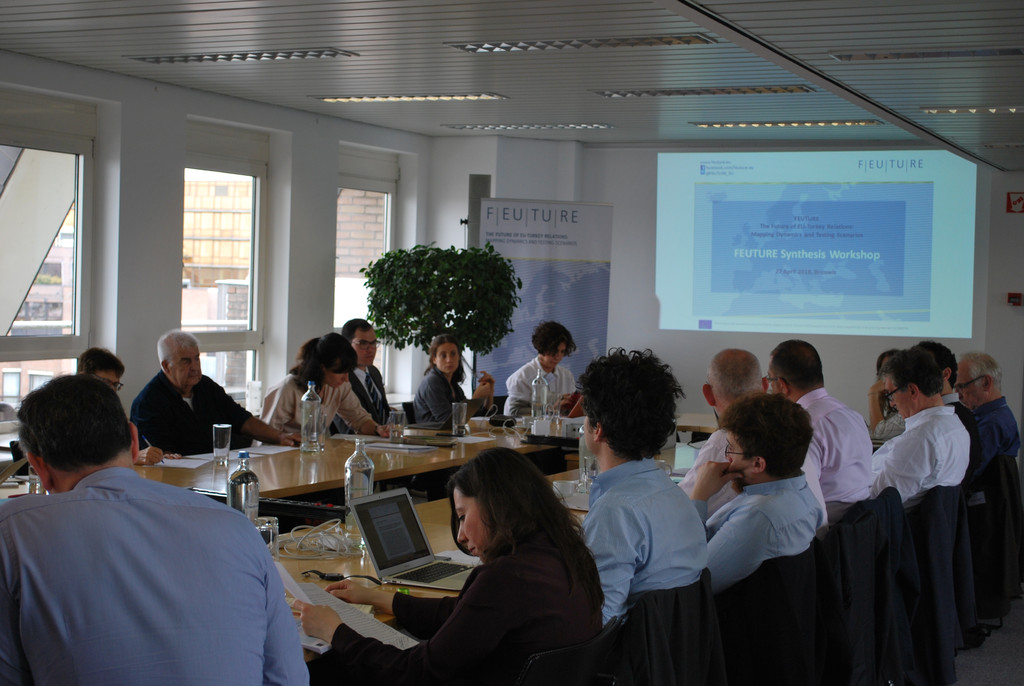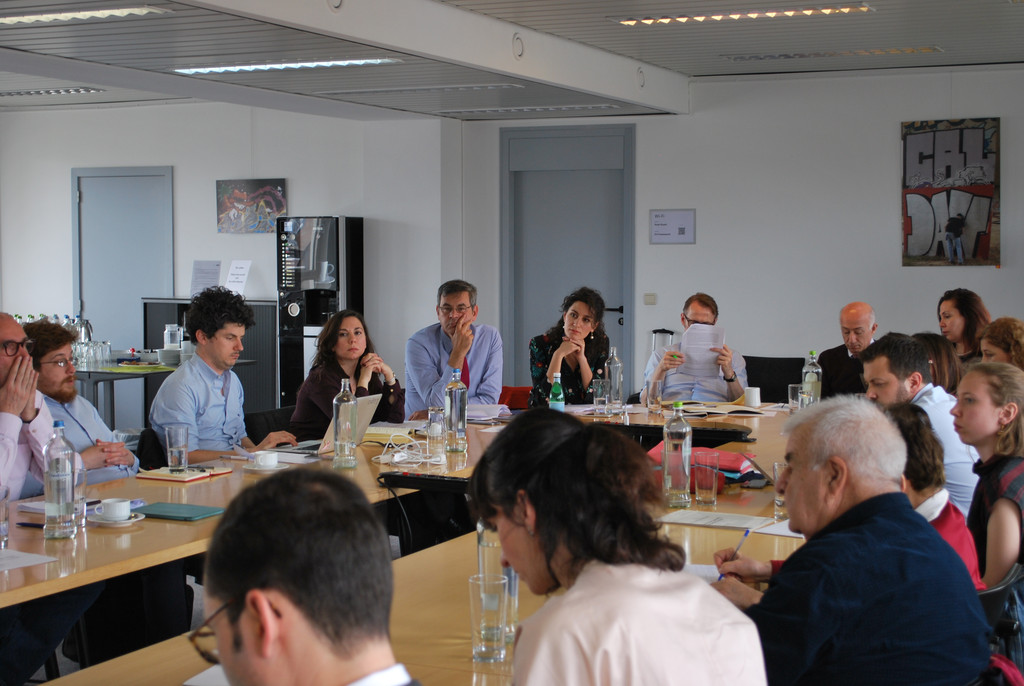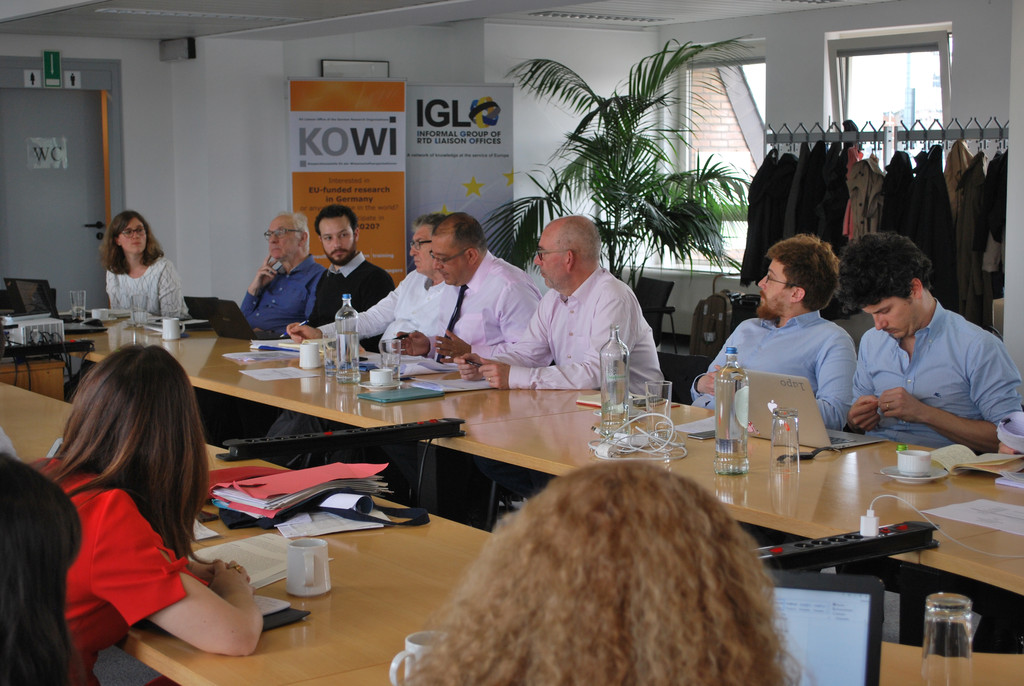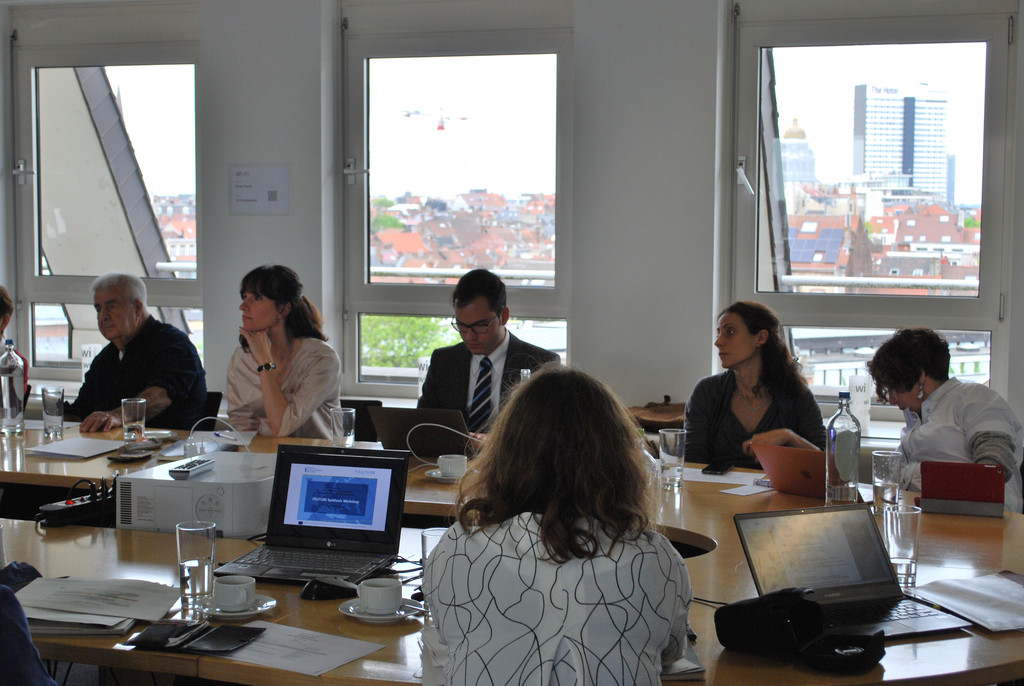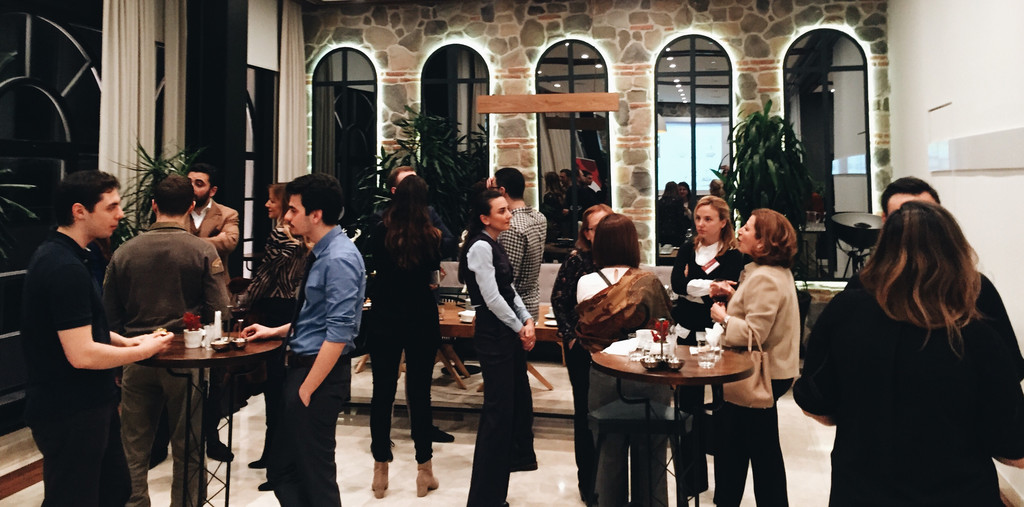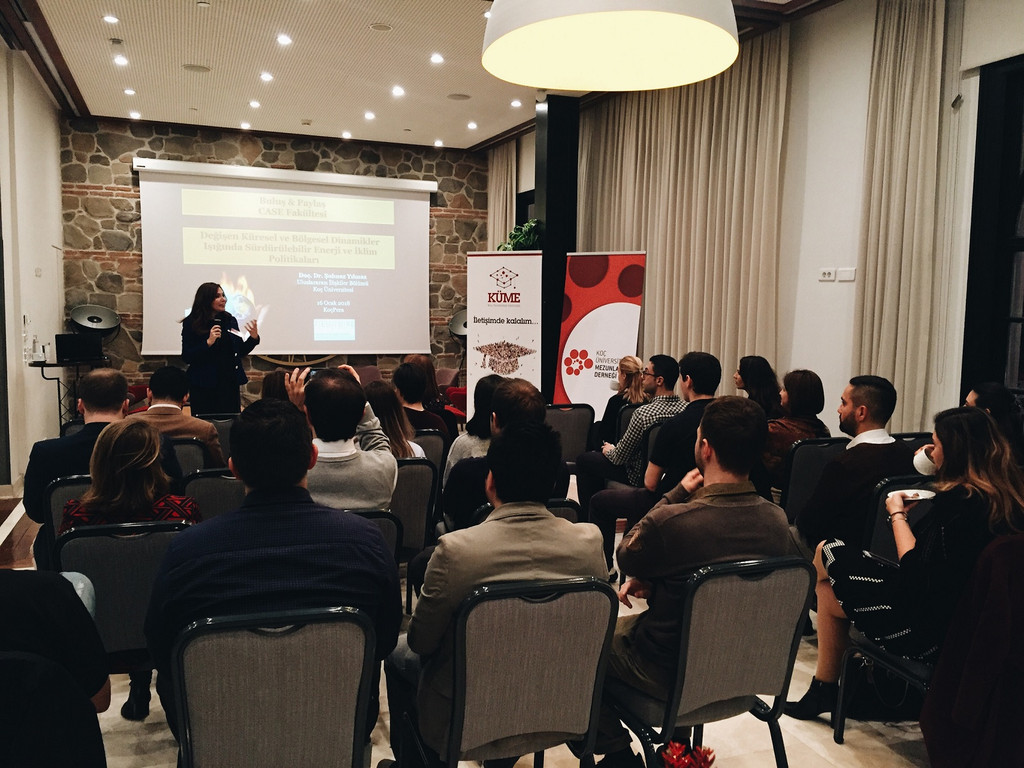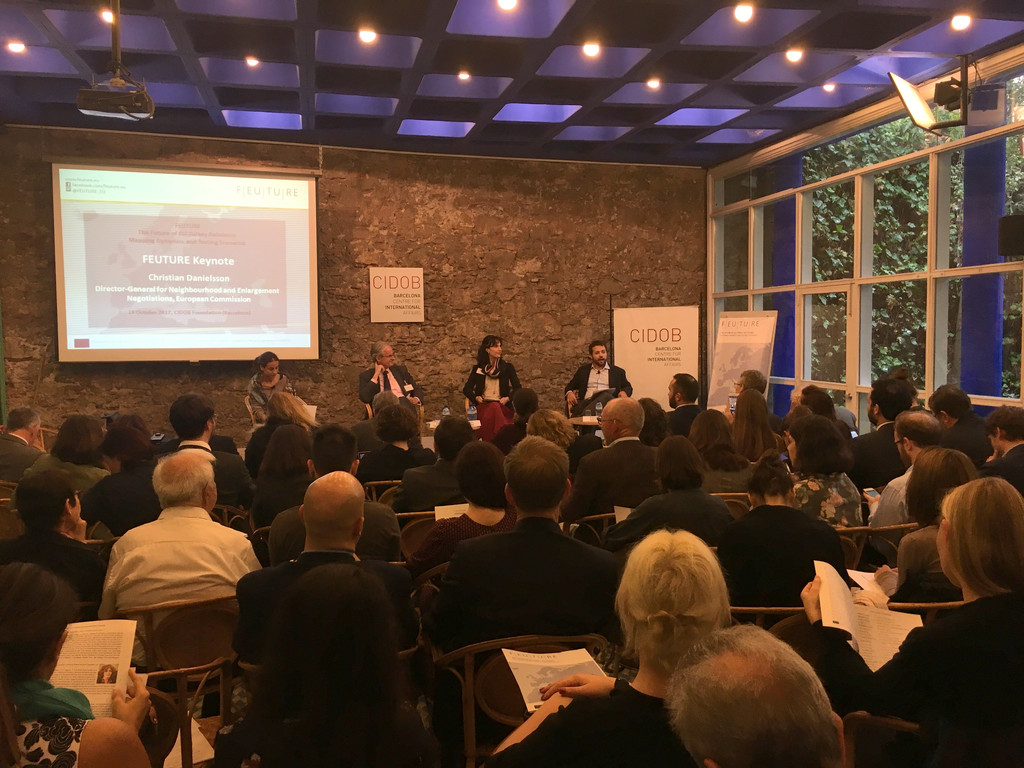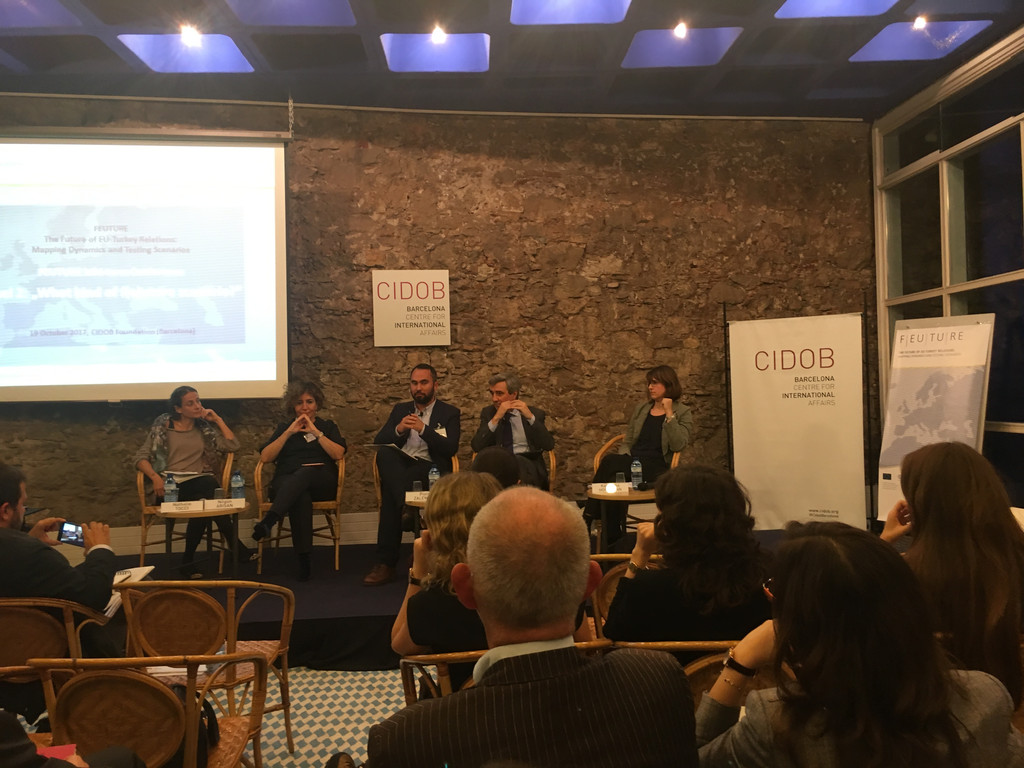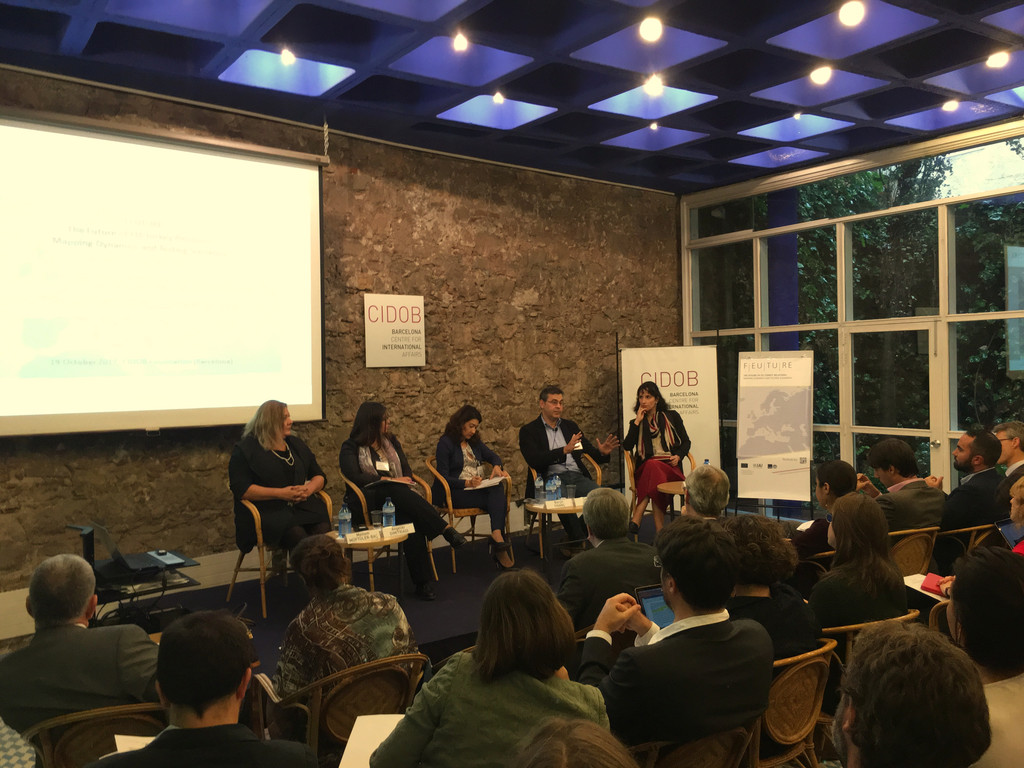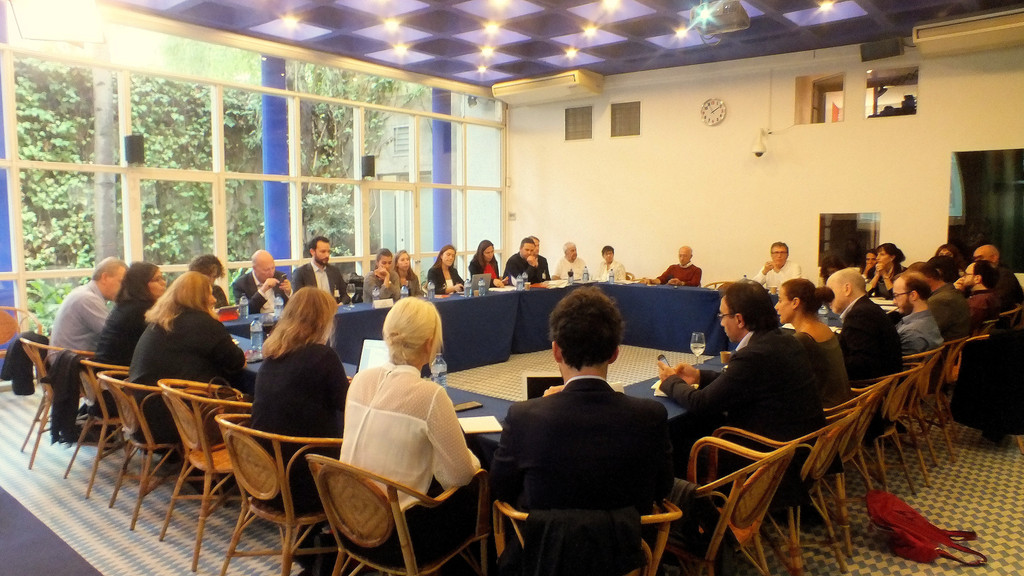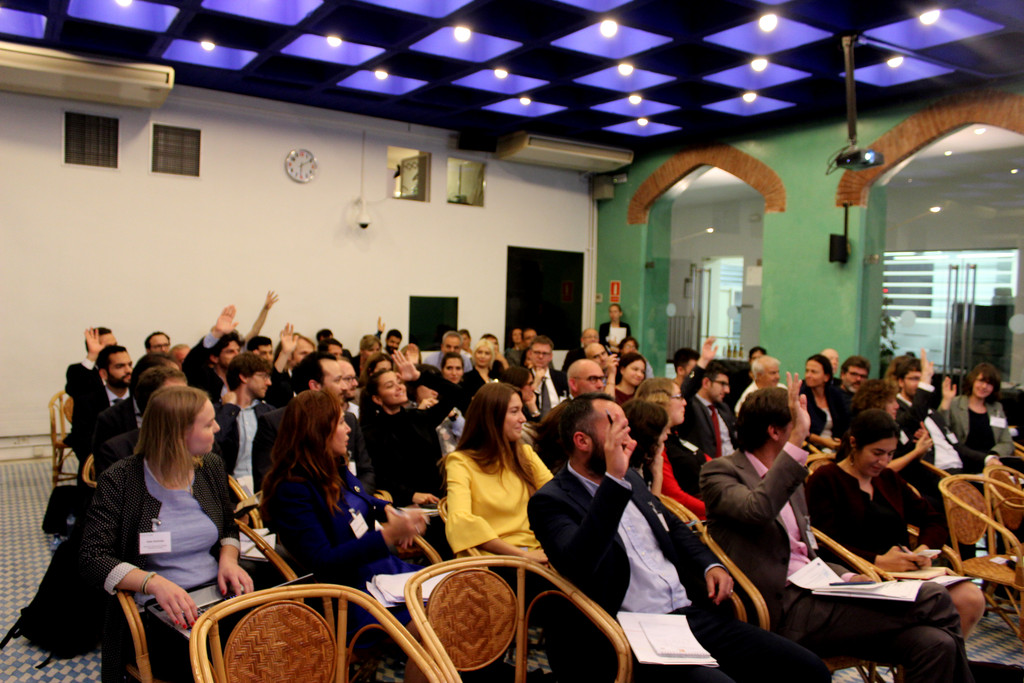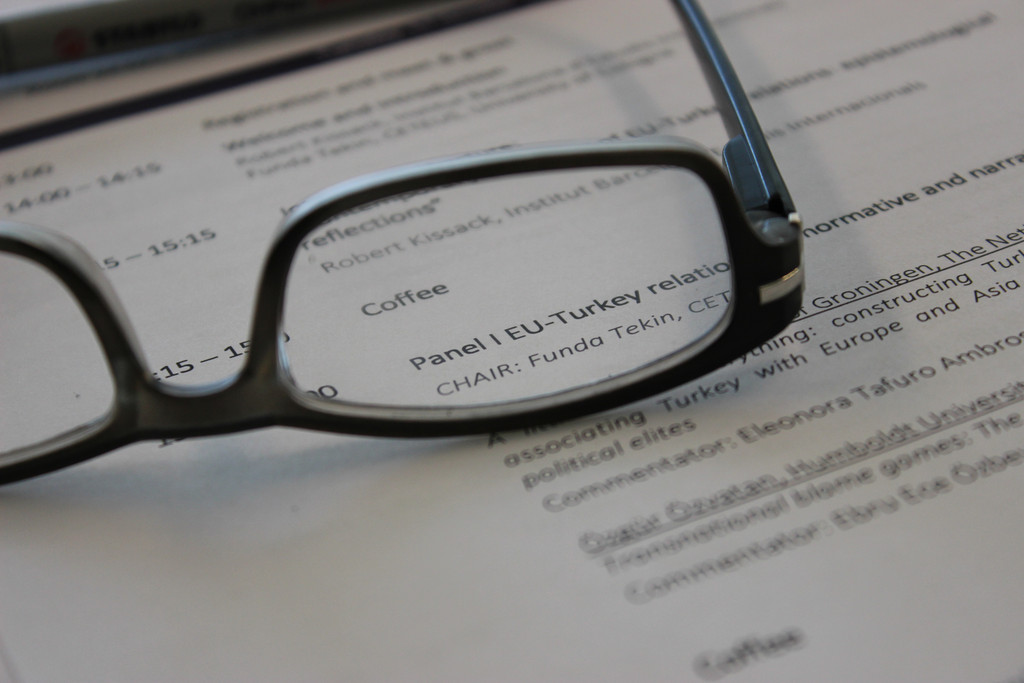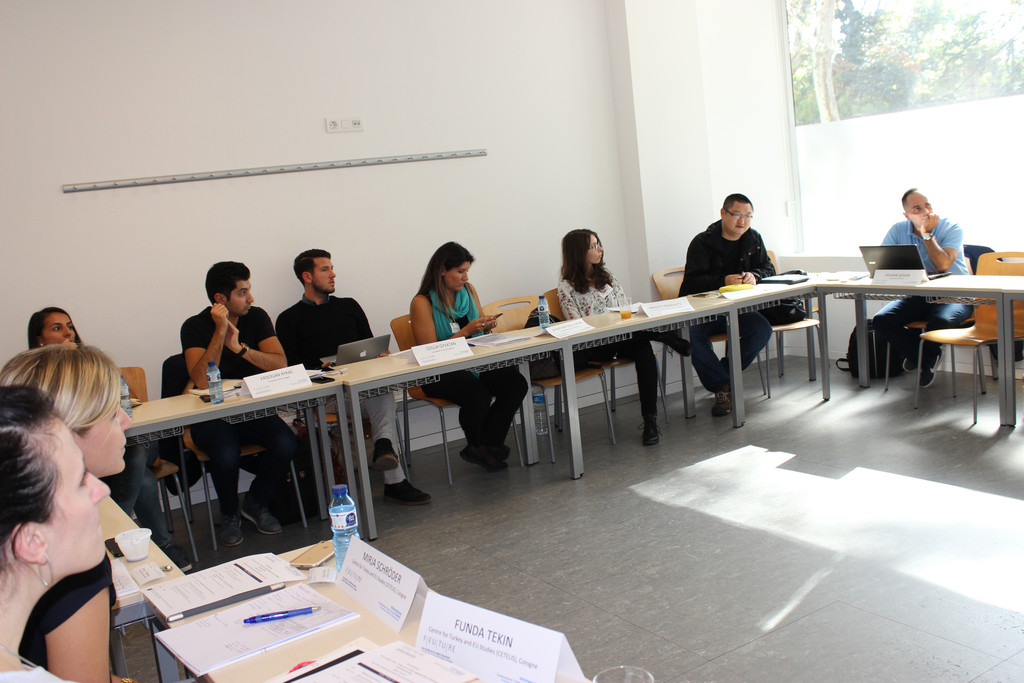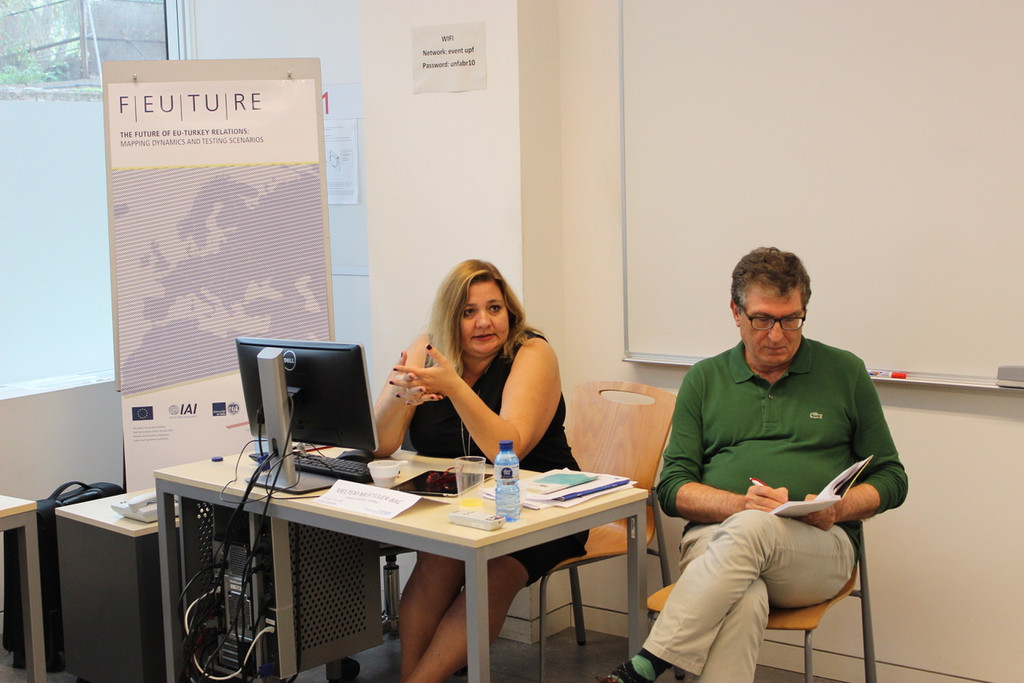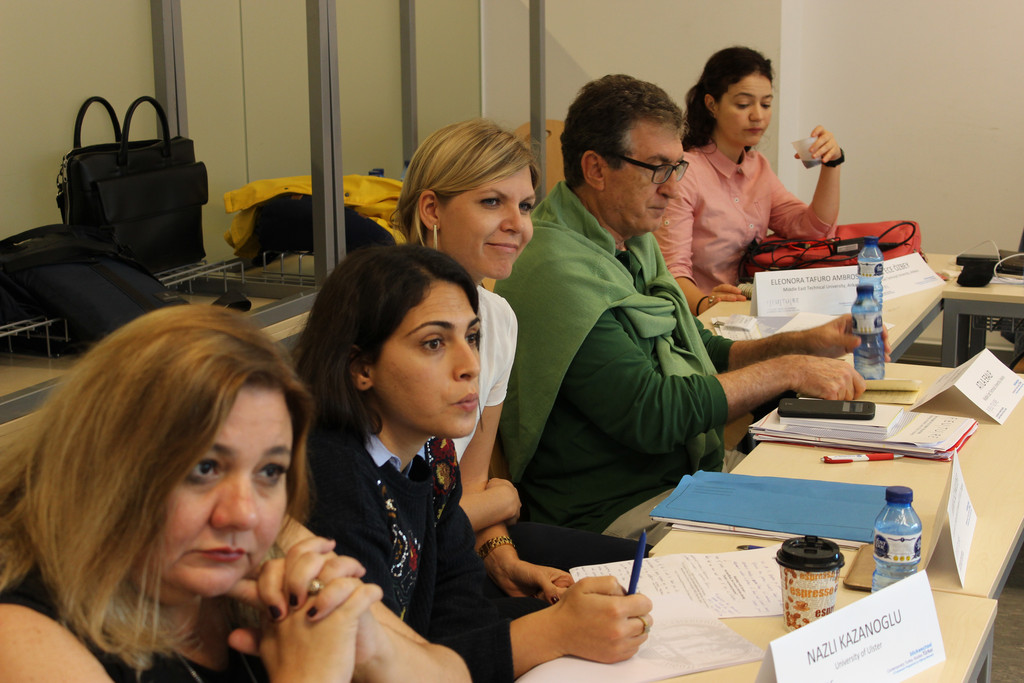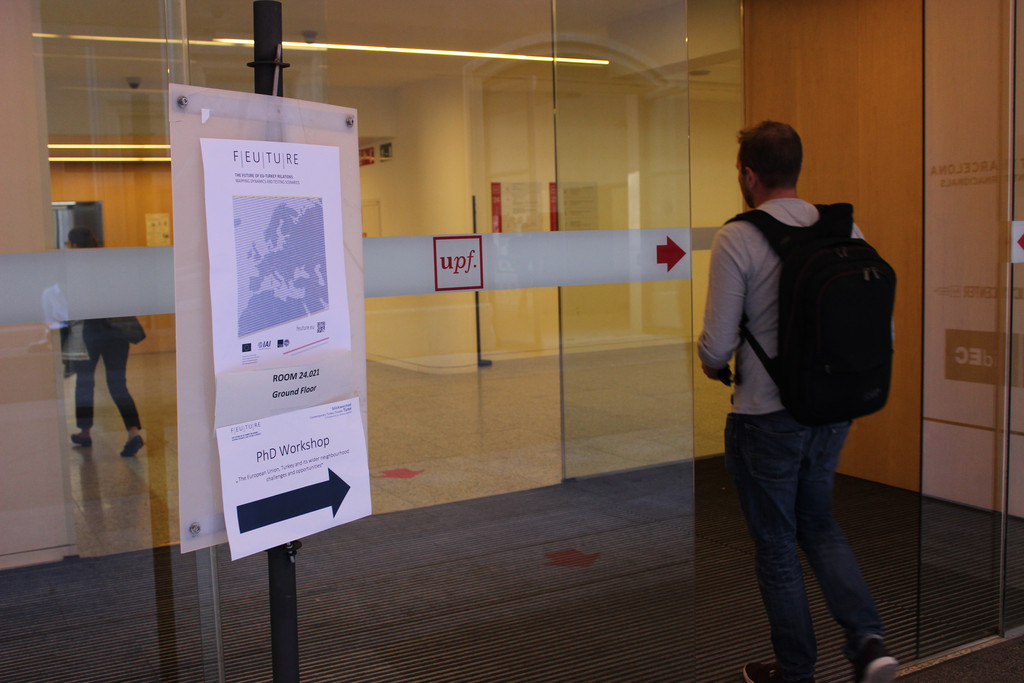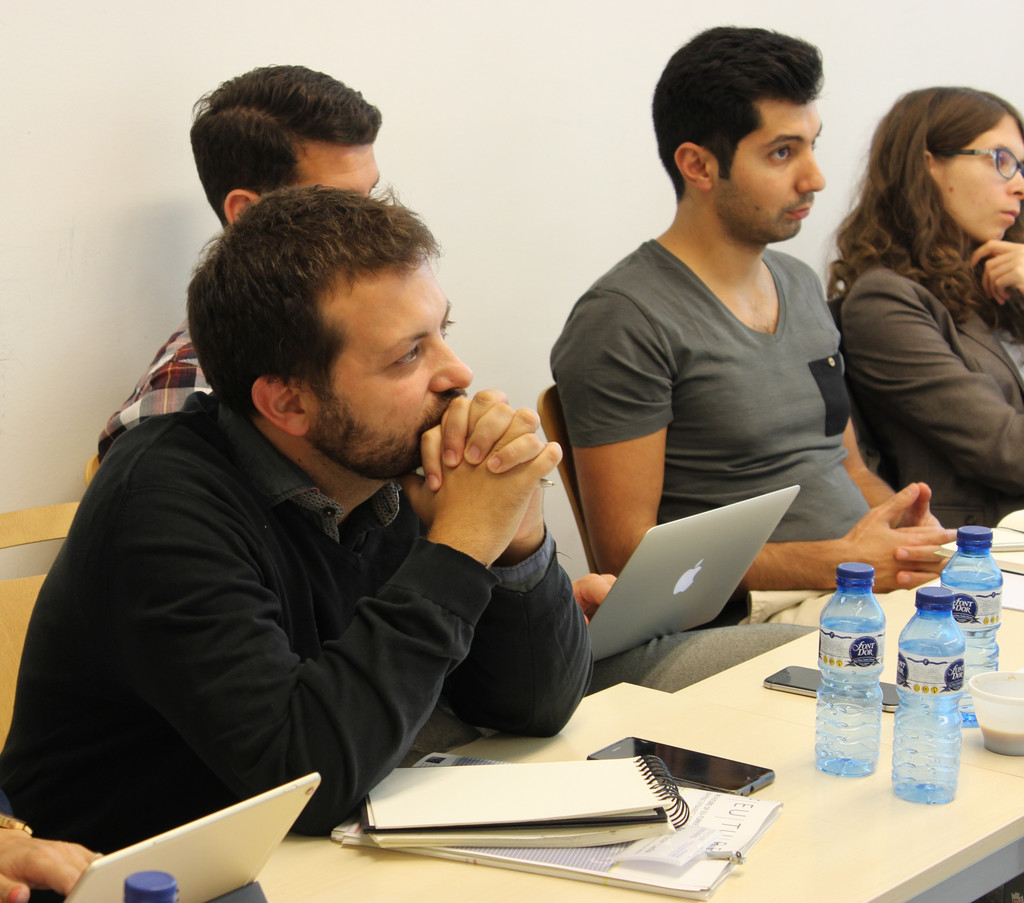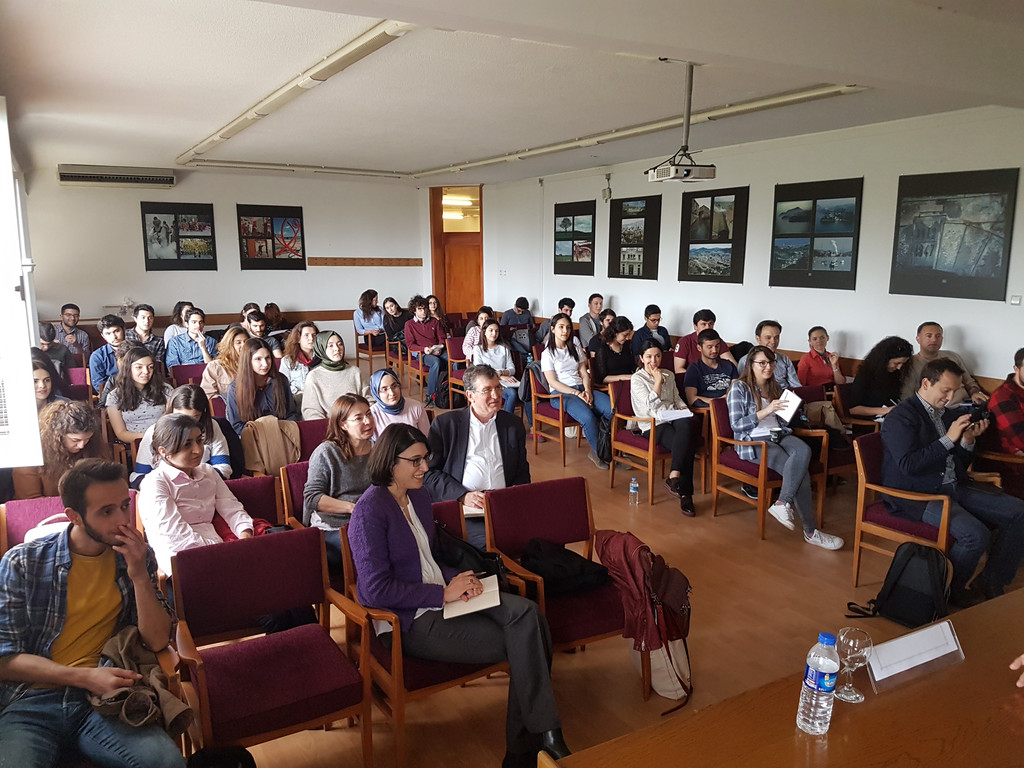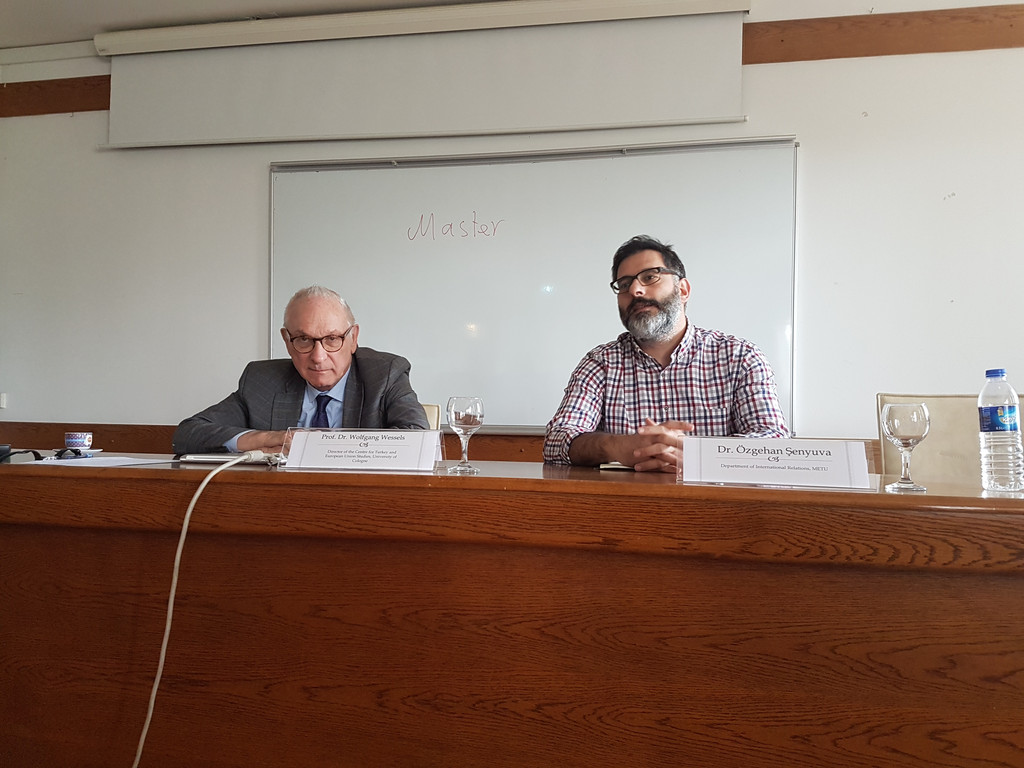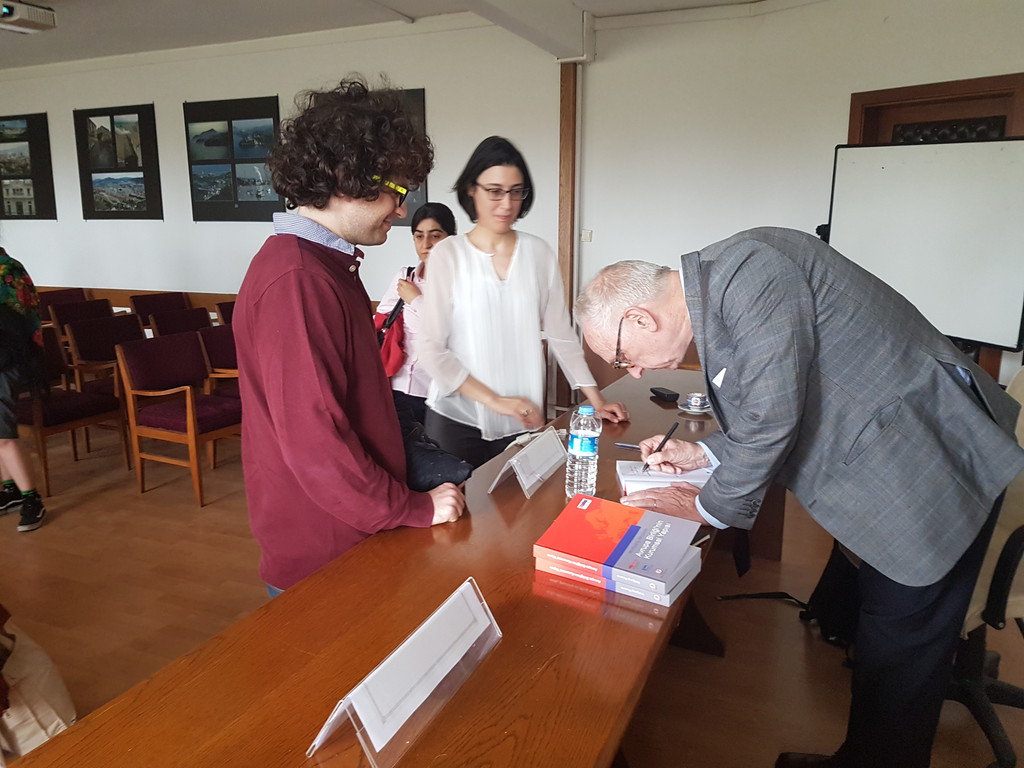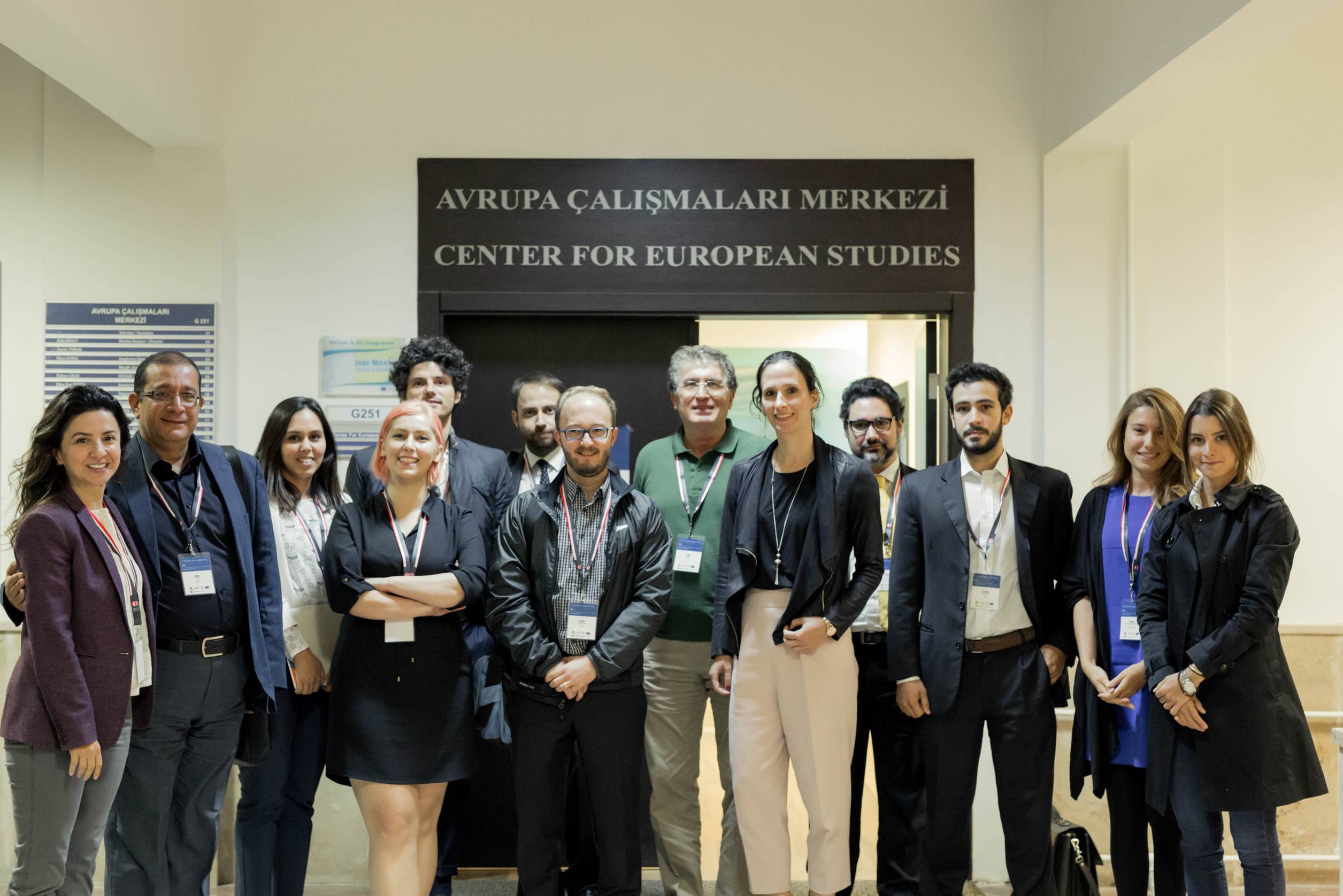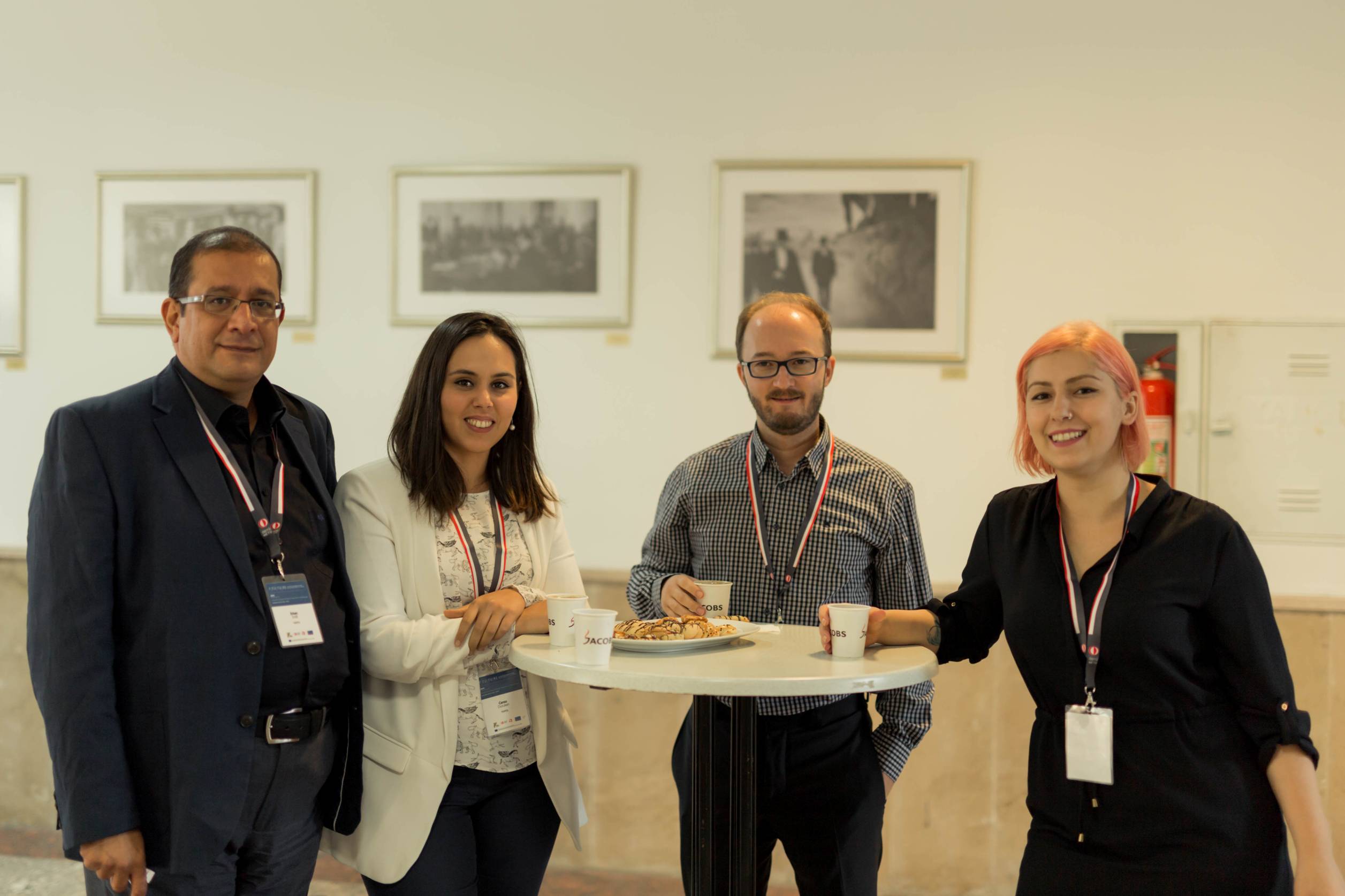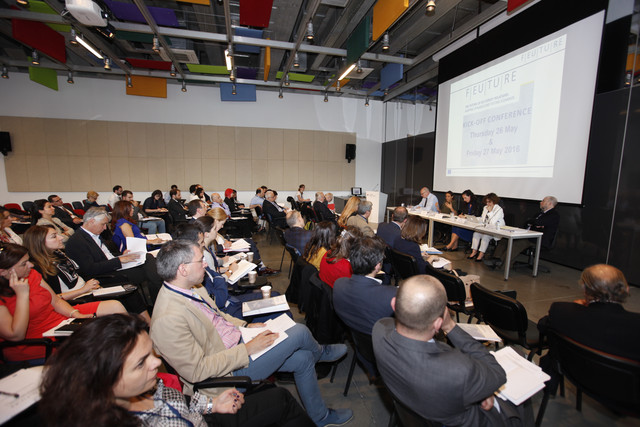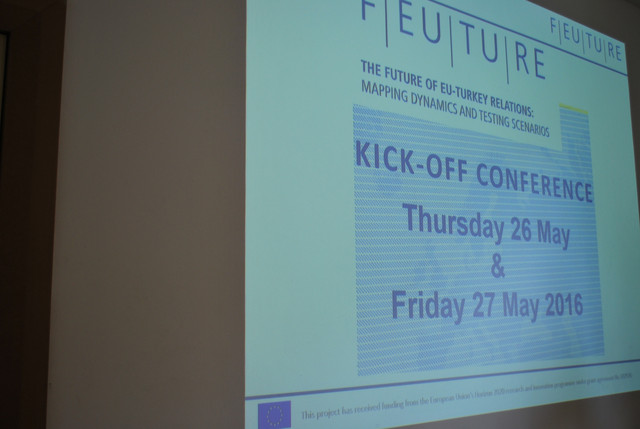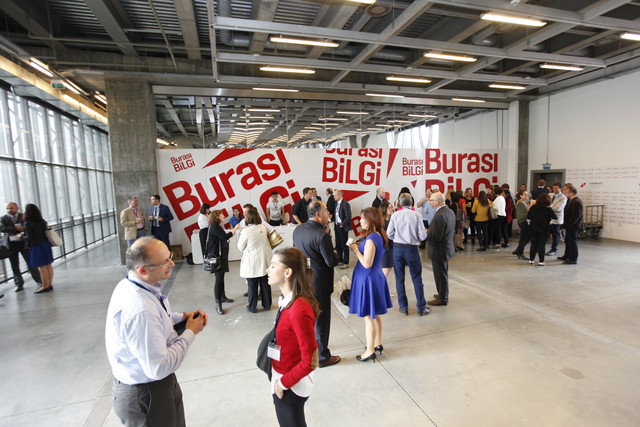FEUTURE Concluding Conference
On 28 February and 1 March 2019, after three years of successful collaboration and joint research, FEUTURE held its final conference in Brussels hosted by the Trans European Policy Studies Association (TEPSA) and organized together with the University of Cologne (UoC). This event provided many opportunities to discuss FEUTURE´s scientific output with the Consortium, Members of the Scientific and Policy Advisory Board, Stakeholders, Diplomats, and the interested public – a total of 81 participants.
Policy Challenge Session
EDAM, Istanbul
On March 25, 2019, the Center for Economics and Foreign Policy Studies (EDAM) organized a policy challenge session, with the participation of a distinguished audience following EU-Turkey relations, which included retired ambassadors, journalists and academics outside of the FEUTURE consortium. The event took place at the Columbia Global Center, in Istanbul and lasted from 19:00 to 21:30. Moderated by EDAM Chairperson Sinan Ülgen, the session started with a brief presentation of the FEUTURE Final Synthesis Paper by Beken Saatçioğlu. Subsequently, Prof. Meltem Müftüler-Baç offered her comments as discussant and opened the floor to questions. The discussion lasted for more than an hour and was extremely fruitful for debating not only the findings and recommendations of the synthesis paper but also reflecting on the future of the EU-Turkey relationship from a broader perspective.
FEUTURE Young Leaders Conference - Future of Turkey and Europe Relations: Scenarios and Possibilities
METU, Ankara
FEUTURE is the largest research project on EU-Turkey relations the European Commission has funded so far, the relevance of which has once again been highlighted by current affairs. Hence, the aim of FEUTURE’s research is to reveal the narratives and drivers of the EU-Turkey relationship, the likely scenario(s) for the future, and the implications these may have on the EU and Turkey, as well as the neighbourhood and the global scene.
As the closing of the project approaches, the Middle East Technical University (METU) FEUTURE Team is delighted to have hosted a Young Leaders Conference to foster further intellectual debate and exchange of ideas among the younger generation of researchers, opinion leaders, representatives of civil society, bureaucracy and business circles. It included a public event, which brought together a wide-ranging scope of participants including bureaucrats, civil society representatives and academic circles, and four roundtables gathering young researchers and academics dealing with different aspects of the future of the EU-Turkey relationship. More than 120 participants took part at the conference. The institutional affiliations of the participants included several European embassies, funds and think tanks such as German Marshall Fund and Istanbul Policy Center, universities in and outside of Ankara as well as NGOs and projects such as the German-Turkish Youth Bridge and TEPAV.
Detailed information and the outcomes of the TRIANGLE project were shared with and presented to a wide-ranging scope of participants by Dr. Özgehan Şenyuva (METU) during the welcoming speech. The research in progress and remaining plans for further TRIANGLE activities and meetings were also outlined by Dr. Özgehan Şenyuva during the same speech.
FEUTURE Policy Challenge Session on Energy and Security matters
ELIAMEP, Greece
In the framework of the FEUTURE project, the Hellenic Foundation for European and Foreign Policy (ELIAMEP) organized a Policy Challenge panel discussion on: EU-Turkey Relations: What Policy Challenges? Security and Energy on Thursday 21 February 2019 at the Representation of the European Commission in Greece.
Click here for the agenda.
FEUTURE European Council Simulation Game
CIFE, Nice
On 9 and 10 January 2019, the Centre international de formation européenne (CIFE) organised a two-day simulation of a Summit of the European Council tackling the future of Europe with a special focus on EU-Turkish relations.
The simulation took place in the framework of the HORIZON2020 Project FEUTURE. 36 participants represented 12 actors (the Presidency of the European Council and 11 Member States) and engaged in a lively debate about the future of relations between the European Union and Turkey in particular. The simulation was preceded by two weeks of pre-negotiations via an online-platform and was moderated by the simulation game experts of planpolitik.
Read more here.
FEUTURE Lecture „The F(e)uture of EU-Turkey Relations”
UzK and CIFE, Nice
On 8 January 2019, Funda Tekin, Project Director of the H2020 Project FEUTURE, gave a lecture at Centre international de formation européenne (CIFE). This FEUTURE Lecture “The F(e)uture of EU-Turkey Relations” aimed at preparing master students for their participation in the FEUTURE simulation on 9 and 10 January 2019 in Nice. Funda Tekin provided detailed insights into the history and institutional frame of the contested EU-Turkey relationship and discussed the political drivers within these relations. She discussed with the students the question of what kind of scenario they thought to be most likely for the future relationship and what kind of solutions they would suggest for the most pressing challenges. In cooperation with the students main veto points in the relationship were identified. Students were particularly interested in discussing in how far migration policy had changed EU-Turkey relations. The lecture concluded with an open discussion of possible scenarios for the future relationship in view of models for different institutional forms of association or integration.
FEUTURE Lecture by Prof. Wolfgang Wessels
UzK, Cologne
On 27 November 2018, FEUTURE Coordinator Prof. Wolfgang Wessels from the University of Cologne (UzK) together with Ebru Ece Özbey (METU) held a lecture about German, European and Turkish narratives on Turkey-EU relations. Jointly organized by FEUTURE and TRIANGLE - Blickwechsel in EU/German-Turkish Relations Beyond Conflicts the lecture shed light on the ever-changing turbulent relations between Turkey and the EU and on how they are perceived in Berlin, Ankara, and Brussels. Which aspects of the partnership are being highlighted, which are left out? Concludingly, Prof. Wessels stirred up a discussion with the audience about the historical developments of the narratives and their impact on today's political debate.
FEUTURE Expert Workshop: "Game (Not) Over: Mapping Dynamics and Testing Scenarios in EU-Turkey relations in a Global Perspective"
IAI and EDAM, Bodrum
On 15 October 2018, Istituto Affari Internazionali (IAI, Italy) and the Centre for Economic and Foreign Policy Studies (EDAM, Turkey), who lead Work Package 8 Synthesis of Research Findings and Policy Recommendations, organized a FEUTURE Expert Workshop in Bodrum, Turkey.
The workshop brought together a group of experts for a strategic dialogue on the future of the EU’s relations with Turkey in a changing political environment. In particular, the workshop offered the FEUTURE consortium the possibility to test the project’s research findings with a wide range of external stakeholders, including academics, think tankers, policy makers, journalists, and civil society representatives from EU, Turkey, the neighbourhood and the global scene.
The workshop was opened by Nathalie Tocci (FEUTURE Scientific Coordinator and Director of Istituto Affari Internazionali), Funda Tekin (FEUTURE Project Director, Vice-Director of the Centre for Turkey and EU Studies at the University of Cologne, and Director of the Institut für Europäische Politik), and Sinan Ülgen (FEUTURE Work Package Leader, Chairman of the Centre for Economics and Foreign Policy Studies and Visiting Scholar at Carnegie Europe).
The first session was chaired by Nathalie Tocci and discussed the FEUTURE Synthesis Paper. It featured contributions by Sinan Ekim (Junior Researcher at Istituto Affari Internazionali), Beken Saatçioğlu (Associate Professor at MEF University) and Funda Tekin. The panel outlined that, on the basis of FEUTURE’s extensive research on different drivers, the most likely scenario for the evolution of EU-Turkey relations until 2023 appears to be one of “conflictual cooperation” and that, as consequence, a “creative association” should be framed between Turkey and the EU.
The focus of the second session, chaired by Sinan Ülgen, was on the policy recommendations that can be drawn from FEUTURE’S research. It featured contributions by Aslı Aydıntaşbaş (Senior Policy Fellow at the European Council on Foreign Relations), Daniel Gros (Director of the Centre for European Policy Studies), Kati Piri (Member of the European Parliament) and Piotr Zalewski (Turkey Correspondent at The Economist).
The third and final session discussed EU-Turkey relations in the broader global context and was chaired by Funda Tekin. Nigar Göksel (Turkey Projector Director at International Crisis Group), Paul McCarthy (Regional Director for Europe at the International Republican Institute), Tengiz Pkhaladze (Advisor to the President of Georgia) and Amanda Sloat (Robert Bosch Senior Fellow at Brookings Institution) contributed to the debate.
In the concluding remarks, FEUTURE Project Coordinator Prof. Dr. Wolfgang Wessels offered his take on the FEUTURE of EU-Turkey cooperation.
Click here for a detailed report.
Joint Workshop of WP1 and WP7 on "History of EU-Turkey relations"
Bodrum, Turkey
On 16 October 2018, the leader of Work Package (WP) 7 "Identity and Culture Drivers", Assoc. Prof. Dr. Bahar Rumelilie (Koc University), as well as Prof. Dr. Atila Eralp (METU) and Prof. Dr. Wolfgang Wessels (University of Cologne), who have worked in WP 1 on the analysis of narratives on EU-Turkey relations, met in Bodrum for a Joint Workshop on History of EU-Turkey relations. They were joined by the Project Director, Dr. Funda Tekin.
The main agenda points were the issues related to a joint paper that both WPs are currently preparing. This paper will bring together the results of the narrative analysis conducted in WP1 as well as the research on identity and culture drivers in WP7. The researchers, among others, concluded that the narratives identified by the team of WP1, arguably, are situated in a much longer history of political and cultural interaction between Europe and Turkey. Hence, the upcoming joint paper will provide a sound contextualization of the research in both WPs.
Closed Door Meeting with EU Stakeholders
Brussels
On 27 September 2018, FEUTURE's coordinators and Work Package leaders gathered in Brussels to meet with stakeholders from the European Commission, the Council of the European Union and the European External Action Service (EEAS). More than two years into the project’s work, FEUTURE researchers had the chance to discuss with them major outcomes of the research and conclusions on possible f(e)utures of the EU-Turkey relationship in a closed-door meeting under the title "different scenarios & different f(e)utures".
The discussion included a summary of the main research findings of each FEUTURE thematic Work Package, which was followed by a discussion on the framework of “creative association” for the FEUTURE of EU-Turkey relations. The meeting provided FEUTURE researchers with valuable inputs that will be incorporated in the ongoing research.
FEUTURE PhD Workshop with Policy Challenges Session and Conference with EUNIC: “Between Rapprochement and Rejection: Identity and Culture Drivers in the Europe-Turkey Relations”
Koc University & Sabanci University, Istanbul
FEUTURE Work Package 7 researchers from Koc and Sabanci Universities organized a joint dissemination event in cooperation with EUNIC (EU National Institutes of Culture) on 14-15 September 2018 in Istanbul. The event provided a unique forum of specialized exchange between academics and policymakers working on identity and cultural dimension of Europe-Turkey relations. The first day of this two-day event was held at the premises of the Austrian Consulate and was sponsored by EUNIC, at the initiative of the Director of the Austrian Cultural Forum in Istanbul, Ms. Romana Konigsbrun. It included a public presentation of the FEUTURE WP7 findings, a FEUTURE policy challenge session featuring practitioners of European cultural policy in Turkey, and an expert session featuring five academics focusing on the identity and cultural aspects of Europe-Turkey relations from Austria, Italy, Poland/Germany, and Sweden. The second day featured a FEUTURE PhD workshop, where nine junior researchers based at different universities in Turkey and Europe presented their ongoing research on the identity and cultural aspects of Europe-Turkey relations.
The event was overall well attended and reached a total audience of approximately 80 academics and policy makers. Those included the Head of the EU Delegation in Turkey, Ambassador Christian Berger.
The full programme of this dissemination event as well as more photos will soon be made available at https://kocjeanmonnet.ku.edu.tr/node/76.
Synthesis Workshop
Brussels
On 27 April 2018, FEUTURE researches of all work packages met in Brussels to discuss the results of the last two years. Researches summarised and discussed their main findings. The aim was to inform each other on the most likely scenario for overall EU-Turkey relations.
Read here soon the full report.
FEUTURE Policy Challenge Session on energy and security matters
MERI, Iraq
On 19 April 2018, the Middle East Research Institute (MERI) organized a FEUTURE Policy Challenge Session to debate the main challenges in EU-Turkey relations in the field of security and energy. The event brought together a number of stakeholders, including the Turkish Consul General in Erbil Mr Hakan Karacay, the Head of the EU Liaison Office in Erbil Ms Clarisse Pasztory, as well as experts and academics, including MERI researchers Dlawer Ala’Aldeen and Kamaran Palani. The Policy Challenge Session discussed two studies recently published by MERI, which put forward recommendations on how to improve the relationship between the EU and Turkey in the security and energy sectors.
Read full report here.
FEUTURE Lecture by Suhnaz Yılmaz
KU, Istanbul
On 11 April 2018, FEUTURE researcher Suhnaz Yilmaz from Koc University organized a FEUTURE Lecture in collaboration with the Corporate Relations and Resource Development Department of Koç University (KU) based on the FEUTURE Online Paper No. 2 “Energy and Climate Strategies, Interests and Priorities of the EU and Turkey”. The lecture focused on the links between energy, climate change and sustainability with a specific emphasis on their implications for Turkey-EU relations. The goal has been to raise public awareness regarding these critical issues. The lecture was followed by a discussion session where the participants were able to ask questions and provide their input. Participants in the event included high school and current Koç University students coming from eight different cities in Anatolia including Erzurum, Diyarbakır, Bayburt, Konya, Tekirdağ, Trabzon, Yozgat and Hakkari.
Apply now: Conference and PhD Workshop at the Austrian Cultural Forum and Koc University on 14-15 September 2018
The PhD workshop is organized as part of FEUTURE and will be held in conjunction with a conference on 14 September 2018, organized with EUNIC (EU National Institutes for Culture) at the Austrian Cultural Forum in Yenikoy, featuring expert speakers, a policy challenge session, and the presentation of FEUTURE project results. Updated information about the conference program and workshop will be made regularly available at http://kocjeanmonnet.ku.edu.tr.
Application Procedure and Timeline: Recent PhDs (within the past 3 years) and students currently enrolled in PhD programs are invited to apply. 250 word abstracts should be submitted to fcelik17@ku.edu.tr by Tuesday, 15 May 2018. Selected participants and the full conference program will be announced by 1 July 2018. The selected participants will be required to submit their full papers by 7 September 2018. Following the conference and the PhD Workshop, selected papers will be published as part of the FEUTURE PhD Online Paper Series.
Participants are expected to make their own travel arrangements and take part in the full 2-day program (conference + PhD workshop, 14-15 September 2018). Limited travel support is available for participants based outside of Istanbul.
For more information please click here.
FEUTURE Joint Workshop of WP3 and WP5
IAI, Rome
On 22nd and 23rd March 2018, the Istituto Affari Internazionali (IAI) organized and hosted a joint meeting, aimed at discussing the FEUTURE Work Packages on “Economic Drivers" (WP3) and on “Energy and Climate Drivers" (WP5).
Researchers from METU (leading Work Package 3) and from IAI (leading Work Package 5), were joined by other partners and researchers from Koç University, University of Cologne, ELIAMEP, AUC and MERI.
On the first day Funda Tekin (University of Cologne) opened the workshop, followed by Erkan Erdil (METU-TEKPOL) and Nicolò Sartori (IAI) that assessed the work done in the last months within their respective work packages and the steps forward towards the synthesis papers. A deeper and more detailed assessment of energetic and climate drivers was carried on in the afternoon of the first day, together with a fruitful discussion on the measurement, weighting and ranking of the different dimensions characterizing each driver. An equivalent exercise was done the second day on all economic drivers and their measurement in order agree on the framing of scenarios.
The two-day workshop contributed in collecting further insights for the evaluation of drivers and for a 360° examination of their impact on future scenarios in the EU-Turkey relationship.
FEUTURE Joint Workshop of WP2 and WP4 on Political and Security Drivers
CES-METU, Ankara
On 20 and 21 February 2018, the Center for European Studies of Middle East Technical University (CES-METU) organized and hosted a series of FEUTURE events in Ankara, Turkey: a Public Debate, a joint workshop of the FEUTURE Work Package 2 "Political Drivers" and Work Package 4 "Security Drivers" and Policy Challenge Sessions.
They provided detailed analysis on a wide range of issues, promoted effective collaboration, stimulated lively discussions, and prompted an exchange of opinions drawn from more than 50 participants from academia, government, diplomacy, business, and civil society. In this regard, it has generated essential input for the research conducted under the FEUTURE project and valuable content for the audience of the public events.
Read the full report here.
FEUTURE Joint Workshop of WP6 and WP7
IPC-SU, Istanbul
FEUTURE researchers from the Work Packages (WP) 6 “Migration Drivers” and 7 “Identity and Culture Drivers” met on 12 February 2018 at Istanbul Policy Center/Sabanci University (SU) in Istanbul to discuss the research on drivers of EU-Turkey relations from these two thematic dimensions and to delineate the implications for the substantiation of a most likely scenario from their perspective.
The WP members presented the results of their research in order to update their fellow WP partners and those of the cross-cutting WPs. In the discussion, several drivers and brakes were discussed in more detail. A special focus was put on drivers from the migration-identity nexus, i.e. possible overlaps between the Work Packages. One of the central questions in this context is whether recent migration flows have an influence on the identity discourses in Turkey and the EU. The researchers also discussed the possibility of a new wave of irregular migrants which could try to make their way from Turkey to Greece in the next months. This could potentially be a “wild card”, meaning a driver or change that could revise existing trends.
Further, the research results from the partners in Egypt and Georgia were discussed who analysed the “outside” perspective from the Southern and Eastern neigbourhood for WP7. Their research shows that the migration deal had a (negative) influence on the perception of the EU and Turkey and their relationship from a US and Egyptian perspective.
Lastly, the researchers discussed the research results in light of the task of delinating a most likely scenatio. For example, from WP6 perspective, it was outlined that according to the current state of the research, a cooperation scenario with potential of conflict due to diverging interests seems to be the most likely scenario.
FEUTURE Lecture by Suhnaz Yılmaz
KU, Istanbul
On 16 January 2018, FEUTURE researcher Suhnaz Yilmaz from Koc University (KU) in collaboration with Koc Alumni Club organized a FEUTURE Lecture based on the FEUTURE Online Paper No. 6 “Energy and Climate Security Priorities and Challenges in the Changing Global Energy Order”. The lecture focused on the links between energy, climate change and sustainability, and elaborated on the implications of these intricate links on Turkey-EU relations. The lecture was followed by a discussion session where the participants were able to provide their input. Participants in the event included Koç University graduates working in different areas in the private and the public sector and in NGOs, as well as academics.
FEUTURE Mid-term Conference "EU-Turkey Relations: Game (not) over?"
CIDOB, Barcelona
On 19 and 20 October 2017, after 18 months of successful collaboration and joint research, the FEUTURE consortium met with distinguished Turkey experts, stakeholders from Turkey and the EU, the media and a wider interested public at the FEUTURE mid-term conference hosted by the Barcelona Centre for International Affairs (CIDOB) in Barcelona.
The 77 participants enjoyed interesting and lively debates. The conference started with a keynote speech by Director-General for Neighbourhood and Enlargement Negotiation of the European Commission, Christian Danielsson, taking stock of the state of the EU-Turkey relationship. This provided an excellent reference point for the two following panel discussions. Sinan Ülgen (EDAM), Angeliki Dimitriadi (ELIAMEP), Funda Tekin (Project Director, CETEUS / CIFE) and Meltem Müftüler-Bac (Sabanci University) engaged in a lively debate on the question “Drivers and brakes in EU-Turkey relations: ever-changing and ever-challenged?” moderated by Barçın Yinanç (Hürriyet Daily News). The contributions tackled the issues of public opinion in Turkey, migration policy, the relevance of the development of European integration as such and the applicability of the EU’s enlargement policy as we know it. The results of this discussion also fed into the second panel on “What kind of f(e)uture scenario?” moderated by Piotr Zalewski (The Economist). Nathalie Tocci (Scientific Coordinator, IAI), Javier Nino Peres (EEAS), Nilgün Arisan Eralp (TEPAV) and Katharina Hoffmann (University of St. Gallen) discussed different options of how to frame EU-Turkey relations in the future. In spite of the current political debate the general conclusion was that cancelling accession negotiations would not help neither the EU and Turkey nor their relationship. The first day of the conference was concluded by a keynote speech by H.E. Ömer Önhon, Ambassador of Turkey to Spain.
The second day of the conference, 20 October 2017, was dedicated to the project’s internal discussions in which researchers deepened their work within the particular Work Packages (Political Drivers, Economic Drivers, Security Drivers, Energy and Climate Drivers, Migration Drivers, Identity and Culture Drivers) and discuss the progress made so far and the steps still to be taken. FEUTURE’s mid-term conference was closed by a concluding roundtable summarizing the most likely scenarios of the individual Work Packages and preparing the synthesis on the f(e)uture of the relationship that will be further substantiated by mid 2018.
Read here the full report and click here to download the agenda.
TRIANGLE & FEUTURE PhD Workshop
Barcelona, Spain
Under the theme "The European Union, Turkey and its wider neighbourhood: challenges and opportunities" on 17 and 18 October 2017, 11 PhD candidates from several countries took the chance to discuss their PhD theses with international experts such as Meltem Müftüler-Bac (Sabanci University), Robert Kissack (IBEI), Eduard Soler i Lecha (IBEI, CIDOB) and Atila Eralp (METU). The workshop was hosted by Institut Barcelona d'Estudies Internacionales and organized by TRIANGLE, funded by Stiftung Mercator and FEUTURE, funded by the European Union's Horizon 2020 Research and Innovation Programme. Recurring topics in the discussion were narratives in the Turkish-German-EU relations, populism, and the theses' theoretical concepts.
First FEUTURE Lecture by Prof. Wolfgang Wessels
Ankara, Istanbul
On 20 April 2017, Prof Dr Wolfgang Wessels (Director of the Centre for Turkey and European Union Studies at the University of Cologne and FEUTURE Project Coordinator) gave a lecture on the topic "The European Council - The Master of the EU Game" at the Middle East Technical University (METU) in Ankara. Prof. Wessels’ lecture focused on the historical development and role of the European Council in EU-Turkey relations, as well as the decision-making mechanisms, and the highly political nature, and the sphere of influence of this EU institution.
This lecture inaugurated the series of "FEUTURE Lectures" and “FEUTURE Policy Challenge Sessions” that will take place throughout the remaining project lifetime.
Joint Workshop of WP2 and WP4
Istanbul, Turkey
On the 3rd and 4th of November 2016, the Centre for Economics and Foreign Policy Studies (EDAM) organised the joint workshop for FEUTURE Work Packages “Political Drivers” (WP 2) and “Security Drivers” (WP 4) in Istanbul.
FEUTURE researchers from CIDOB (Leader of WP 2) and EDAM (Leader of WP4) came together with work package members from the University of Cologne, CIFE, METU, MERI, CRRC, IAI, DIIS and Eliamep with the aim to make the conceptualization of the research within the framework of these two work packages more precise, also with regard to the present status of EU Turkey relations, the general situation in Turkey and the latest global developments.
The workshop commenced by a discussion of FEUTURE’s three ideal-type scenarios from political and security perspectives. Afterwards the so-called guideline papers that aim at framing and detailing the research in the individual work packages were the center of discussions followed by an in depth analysis of focal issues within each work package. Overall, the workshop sought to find answers to fundamental methodological and contextual questions and explore synergies and inter-linkages between political and security drivers.
The two-day discussions produced wide-range results in terms of the methodology which is going to be used within both work packages and a deepened administrative guidance for the involved researchers. Thus, the joint workshop was a great opportunity for FEUTURE researchers from WP 2 and WP 4 to have fruitful face to face debates and to coordinate further steps within their research.
Leader of Work Package 2 “Political Drivers”: Eduard Soler i Lecha (CIDOB)
Leader of Work Package 4 “Security Drivers”: Sinan Ülgen (EDAM)
Joint Workshop of WP3 and WP5
Ankara, Turkey
On 26 and 27 September TEKPOL and CES from Middle East Technical University (METU) organised and hosted the joint workshop of the FEUTURE Work Packages "Economic Drivers" (WP 3) and "Energy and Climate Drivers" (WP 5) at METU, Ankara.
The workshop gathered FEUTURE researchers from Istituto Affari Internazionali (Leader of WP5), EDAM, ELIAMEP, Koc University, University of Cologne, MERI and AUC. The workshop aimed at detailing the research of these two work packages in light of the overall trajectory of EU-Turkey relations as well as the recent developments in Turkey and on the global scene, with their repercussions for the neighbourhood countries and the FEUTURE Project.
Therefore, the one and a half day lasting discussions started with a presentation and debate on FEUTURE’s set of ideal type scenarios and the historical driver ‘narratives’. Afterwards, participants found the opportunity to engage in a detailed debate on the economic as well as energy and climate drivers and the methodology of the work packages’ research. The results of the debate will feed into the finalisation of the guideline papers of WP 3 and WP 5, which will structure the respective research. This workshop successfully kicked-off research in these two work packages and provided an opportunity for FEUTURE researchers to meet face to face to coordinate their research and engage in fruitful debates.
Joint Workshop of WP6 and WP7
Athens, Greece
was held in Athens, Greece. Hosted by ELIAMEP, in cooperation with Koç University, the workshop sought to identify commonalities and shared issues of research between the two work packages. Partners participating discussed their respective tasks and methodological approach, enabling also an exchange of information and ideas between the two teams. The workshop concluded that particularly on contemporary events, there is an overlap between the work packages as regards drivers (for example visa liberalization) and that the teams will maintain an exchange of resources and information, where needed, to incorporate each other’s findings in the respective material produced.
Policy Challenge Session: FEUTURE Briefing
Barcelona, Spain
On 6 September 2016, CIDOB hosted the Turkish ambassador in Spain, Ömer Önhon, to discuss the recent political developments in Turkey in light of the failed coup attempt on the 15th of July. Throughout the briefing, debates centred up on the domestic and international implications of the coup attempt and the post-coup measures, ongoing tensions with European and Transatlantic allies as well as understanding strategy in Syria.
FEUTURE Kick-off Conference
Taking Stock of EU-Turkey Relations: A Successful Kick-off for FEUTURE
On 26 and 27 May 2016 the research project “The Future of EU-Turkey Relations: Mapping Dynamics and Testing Scenarios” (FEUTURE) funded from the European Union’s Horizon 2020 programme was officially launched. About 100 participants including researchers from the consortium, distinguished Turkey experts, stakeholders and practitioners from Turkey, the European Union (EU) and the neighbourhood, as well as students and the wider interested public got together at the FEUTURE Kick-Off Conference in Istanbul. This event was hosted by Istanbul Bilgi Universitesi.
During the debate of the first day, which was open to the public, different views as to which path relations will most likely take in the future were exchanged and discussed in light of FEUTURE’s research aims and design. FEUTURE’s broad assessment of this relationship acknowledges the depth and intensity of relations between Turkey and the EU. It will combine both a look ‘backwards’ through its analysis of narratives which have shaped the debate in Turkey and the EU in different phases with a forward-looking approach which aims at delineating a most likely scenario(s) for the future and related policy recommendations. All participants welcomed this project and its research approach, because they felt that at this point in time substantial and ambitious research on EU-Turkey relations is highly relevant.
Debating FEUTURE’s Research Design: Future Scenarios and Historical Narratives
The first day of the conference focused on discussing FEUTURE’s scenarios and narratives at two high-level panels with the project’s researchers and renowned Turkey experts from the project’s Scientific and Policy Advisory Board. The aim was to update the project’s research agenda and make it fit to meet the challenges of analyzing EU-Turkey relations which constitute a ‘moving target’ par excellence.
At the first panel, chaired by Funda Tekin (FEUTURE Project Director), Nathalie Tocci (FEUTURE Scientific Coordinator) presented three ideal-type scenarios (Convergence, Cooperation, Conflict) that will be tested through FEUTURE’s research in the upcoming three years. Overall, Tocci identified coexisting trends and concluded that for the project this will also mean that research will most probably not identify only one most likely scenario but rather delineate a mix of their features. Andrew Duff (former MeP), Nilgün Arisan Eralp (TEPAV) and Ronald Linden (University of Pittburgh) agreed and particularly stressed the need for flexibility in these three scenarios. Furthermore they encouraged “out of the box”-thinking by scrutinizing the EU’s relationship with other (new) external countries.
The second panel, chaired by Senem Aydin-Düzgit (Bilgi University), elaborated on the project’s ‘backward perspective’ of EU-Turkey relations in form of the historical analysis of narratives. Wolfgang Wessels (FEUTURE Project Director) and Atila Eralp (METU) presented this part of FEUTURE research that starts from the assumption that a critical assessment of the history of EU-Turkey relations is a key element for delineating scenarios for the future. Therefore, the research aims to 1. map the milestones and periods of EU-Turkey relations and 2. identify the most salient narratives, which have shaped the political debate both in the EU and in Turkey during different historical phases. The representatives from the FEUTURE Scientific and Policy Advisory Board, Albert Rohan (Independent Commission on Turkey), Ofra Bengio (Tel Aviv University) and Meltem Müftüler-Bac (Sabanci University) further contextualized the narrative analysis of EU-Turkey relations by elaborating on four key-terms that have been used in the past and present in order to structure the interrelatedness of the EU and Turkey: 1. Bridge, 2. Model, 3. Orientation and 4. Asset. Additionally, the debate critically assessed the question of how relevant history really was for the present and what the added value of a historical analysis was in light of EU-Turkey relations. Finally, the importance of understanding the EU integration process itself for analysing EU-Turkey relations was underlined.
Getting Started with the Research: Workshops on the Second Day
The second day provided the researchers from the consortium the possibility to familiarize themselves with the details of FEUTURE research. The Work Package (WP) Leaders organized parallel workshops on the six thematic dimensions that FEUTURE will analyse: politics, economics, security, energy/climate, migration, identity/culture. It will be the aim of their research to identify the drivers that determine the relations from these different perspectives. At these workshops in the morning of 27 May 2016, the WP leaders together with their research teams prepared the first steps and updated their research designs with regard to the latest developments.
In a ‘synthesis and outreach’ session led by Nathalie Tocci and Sinan Ülgen the consortium discussed the third phase of the project, which will synthesise and test these results within one or more scenario(s) with the aim of producing policy recommendations. The Kick-Off Conference concluded within the first meeting of the FEUTURE General Assembly, in which the partners’ representatives discussed matters concerning the consortium as a whole.
Read here the detailed conference report.
Kick Off Conference
Istanbul, Turkey
On 26 and 27 May 2016 the FEUTURE Kick-Off Conference in Istan-bul will officially launch the project’s activities including a keynote ad-dress by H.E. Ambassador Rauf Engin Soysal, Undersecretary of the Ministry for EU Affairs.
The conference is hosted by Istanbul Bilgi University. On Thursday 26 May 2016 more than 50 researchers from the FEUTURE consortium will debate with external researchers, students and stakeholders FEUTURE’s three ideal-type scenarios as well as narra-tives of EU-Turkey relations. The members of the FEUTURE Scientific and Policy Advisory Board will pro-vide their expertise to the debate.
The second day of the conference, Friday 27 May 2016, aims for in-depth discussions among the consor-tium members on research within individual work packages. The conference concludes with the first meeting of the FEUTURE General As-sembly.
Click here for the programme
